October 2023: Olive Tree

Volume VIII/Issue 7/October 2023


From The Editorial Desk
Girl Scouts Can Now Earn a Sodomite Patch

The organization of mama bears called “One Million Moms” is exposing another low in the moral decline of the Girl Scouts.
They quote the organization’s website:
“The Girl Scout LGBTQ+ Pride Month Celebration Fun Patch is designed for Girl Scouts of all levels and their leaders to honor LGBTQ+ history, celebrate their diverse cultures and identities of LGBTQ+ people, and acknowledge the many contributions that the LGBTQ+ community has made and continues to make across our nation. Girls and leaders have plenty of activities to choose from to earn this fun patch and we encourage Girl Scouts of all identities to participate.”
In order to earn the patch, here are some of the activities listed:
-
Sketch a portrait of a member of the LGBTQ+ community who you admire.
-
Make a LGBTQ+ music playlist.
-
Create art that celebrates how families come in all kinds.
-
Participate in No Name-Calling Week, which is sponsored by the Gay, Lesbian, and Straight Education Network (GLSEN).
-
Attend an LGBTQ+ Pride celebration.
One Million Moms also notes that this is only a continuation of the Scouts’ moral decline. This slide began several years ago with their support of abortion, Planned Parenthood type sexual education, and other homosexual agendas.
They also point out that only 10 to 20% of the revenue from the Girl Scout cookie sales goes to the local troop. The rest goes to the Girl Scouts USA organization collected as royalty on its trademark. Some of the money then goes to support these perverted agendas.
Unfortunately, the Girl Scouts are not alone in this march to evil.
Mike De Socio is a “queer journalist” writing for the Washington Post. He covered the Boy Scout National Jamboree this summer in W. Virginia and was pleased with what he saw. Among the hundreds of tents was one, “…decorated with a canopy of LGBTQ Pride flags and a string of multicolored lights, its tables covered with bowls of rainbow bracelets, pronoun stickers and diversity patches.”
The tent must have been large because one volunteer told De Socio that there had been up to 2000 kids in the tent at once. The volunteer said:
“But it was all curiosity, and how do I help, rather than [hostility]. So it’s all been incredibly welcoming and positive.”
But the scouts have paid a price.
After admitting homosexual men into their leadership in 2015, transsexual boys in 2017, and girls in 2018, they have lost nearly half their membership. Indeed, the Jamboree was attended by about 15,000 compared to the 40,000 that showed up in 2017.
Shortly after this “openness to diversity,” the organization was hit by 80,000 claims of sexual abuse. The $2.46 billion settlement bankrupted the organization. De Socio tries to spin this to the positive by claiming that it created a shift in focus by the Scouts evidenced by a “diversity, equity, and inclusion merit badge” becoming required for Eagle Scout rank.
To demonstrate how pervasive this is in the organization, De Socio visited the tent set up for girls. There, a 19-year-old “bisexual” volunteer told him:
“I know the people that are coming through here, like trans, nonbinary youth, the queer youth, are having a great time seeing themselves represented in a space that they love so much, that is scouting.”
This shocking attack on the innocence of our children is further evidence that we need to get the gospel out while we still have the freedom to do it.
A number of people have asked for a timeline of events that has happened since his Holiness, Pope Michael I died. I would recommend this article, taken with permission, from the website https://magnuslundberg.net/
I felt that the article was pretty accurate and balanced even though he is not a follower of Michael II. I want to thank him for the effort and time he took to put the article together. After an introduction to the writer Magnus Lundberg, you will be able to read the article.
Introduction
I’m Magnus Lundberg, Professor of Church and Mission History in the Department of Theology, Uppsala University, Sweden. Through the years, much of my research has focused on colonial Latin American church history. Still, from 2015 onwards, I have devoted much time to the study of Catholic traditionalism, Fringe Catholicism and New Religious Movements with Catholic roots, especially modern alternative popes (“antipopes”).
Habemus Papam!: Michael II
On 29 July 2023, Archbishop Rogelio del Rosario Martinez Jr (b. 1970) was elected the successor of Pope Michael (David Bawden) and took Michael II as his papal name.
In February 2023, I wrote a substantial piece on Pope Michael for the World Religions and Spirituality Project. Pope Michael (David Bawden, 1959-2022) was elected in a small conclave in Kansas in 1990 and, for the last decade, based in Topeka. He claimed the papacy from his Vatican in Exile until his death on 2 August 2022.
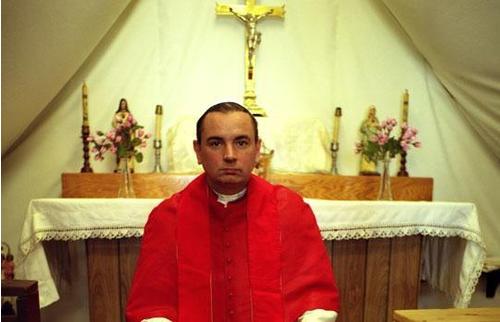
From the time of his passing away, his group of adherents declared the Holy See vacant and began planning for a new conclave. Until recently, no date was fixed, but the group officially announced it in the June 2023 issue of the Olive Tree newsletter.
“On Conclave
It’s almost a year ago when His Holiness Pope Michael of happy memory met his Creator. We are dilapidated by his passing away but we are grateful to the Lord for giving him to us. Pope Michael has left us a legacy that is priceless. That is from mere sedevacantism to conclavism. He did not mind the persecution, what matters is the good of the Church. His reputation was maligned yet what matters to him is ” sentire cum ecclesiae ” i.e.thinking with the mind of the Church.
Taking the above consideration, conclave is a necessity which cannot be set aside. And in this period of apostasy, since no appointed Cardinals can gather to elect the new Pope, Canon Law dictates that the Church supplies what is lacking. And so the ball is on the lay people and clergy to elect a successor to Pope Michael.
The electors are members of the laity and clergy who rejected the Second Vatican Council and the Novus Ordo Missae.
The procedure that will be followed after Holy Mass in honor of the Holy Spirit is casting lots or Cleromancy. It is the ancient and scriptural procedure performed by the eleven apostles in Acts chapter one in order to replace the position left by Judas. The nominees are bishops and priests in communion with Pope Michael. The Conclave shall commence on July 25th, feast of St. James the Apostle and it will be held in Vienna, Austria.
There will be series of cleromancy to be held. For example, Fr. John Doe’s name was picked up in the first casting lot, there will be two or more casting lots to be made. If his name John Doe is consistent in three casting lots, he will be proclaimed the Pope. Habemus Papam.
Position in the Catholic Church is not a prestige but of service. Remember in Mark 10:45, ” I have come to serve and not to be served but to offer my life for the ransom of many. ” Hence, whether one likes it or not, one has to obey out of submission to the will of God.
Oremus ut habeamus Papam.
A conclave update was published in The Olive Tree, July 2023 issue.
” On Conclave
July 16, 1990 was the day His Holiness Pope Michael got elected as successor to Pius XII after a long interregnum. August 2, 2022 was the day Pope Michael passed away. These two days are significant to us in as much as Pope Michael has left us a legacy that is priceless : courage to move from sedevacantism to conclavism.
The world that we live in now is ego centric. What seems to matter most is pleasure. What is good for the self. What is good for the body. It is no longer surprising if submission and obedience are not popular now a days. Thus, it is one of the reasons sedevacantism is popular among traditionalist. Nobody wants to obey a living and breathing Pope. They are stuck in following the precepts of the past. But remaining sedevacantism is tantamount to unwillingness to die to self. With sedevacantism , lawlessness become the rule of thumb. ” you want it, then, do it. ” However, freedom does not mean anarchy.
When July 1990 conclave was held in Delia, Kansas, many personalities were invited to participate. But, only six people manifested their interest. Then, when election of Pope Michael was over, many bashed and criticized him. This was not a surprise since nobody else wants to obey an authority. Everybody wants to be ” the boss”. Everyone wants independence from authority especially the Supreme Pontiff. Nonetheless, the conclavist six that July 1990 has chosen the road less traveled.
Thirty three years have passed, but the lesson must not be forgotten : sedevacantism is not good enough. Hence, this forthcoming July 25, 2023 we shall choose the successor to Pope Michael of happy memory. The electors will be those who are in communion with Pope Michael. Other sedevacantists are no longer invited in as much as they were invited before yet they snubbed the invitation.
We are inviting all of you to pray that we may have a Pope. A Pope after the heart of Our Lord Jesus Christ, the Pastor Bonus. Pray to the Holy Spirit that whoever may be elected among the clergy may sanctify, teach and govern after the image of Apostle Peter not Emperor Constantine.
Service is an offshoot of Charity. It’s a virtue. But Authority is necessary. The Lord Jesus Christ said, ” …teach them to observe all things whatsoever i have commanded you ” ( Matthew 28:20 ). We need a successor to the chair of Peter. In as much as he will be the visible sign of unity.”
On 27 July 2023, as the conclave had started, Archbishop Martinez emailed an update
The death of Pope Michael and situation of sede vacante occurred on August 2, 2022.Public announcements followed on August 9,2022
A meeting of electors was announced for April 2023. Meetings were held in St. Helen Catholic Mission House, Topeka, Kansas, USA from April 13- April 24, 2023. Papal election was postponed.
As new date for a conclave The 25th July 2023, Feast of St James, was fixed. The process of finding the successor of Pope Michael via five rounds of lots drawing and a list of candidates was proposed by Archbishop Martinez. The clergy raised no objections against the method or on the selection of candidates before the conclave began. Also, Archbishop Martinez announced Vienna, Austria as venue for the election.
There were four candidates at the Conclave. Two American priests and Two bishops.
On the Conclave itself, after Mass of the Holy Spirit at 9 in the morning, profession of faith was done by the participants.
Litany of the saints was sung. A priest was elected in that moment. But could not be contacted. A 48 ( Forty eight ) hour rule is given to the selected candidate for him to reply but during the midnight, the priest refused to accept his election.
We will be meeting again at 11:00am 7/27/2023 27 Vienna / Austria. Thank you for your continued prayers.
On 29 July 2023, Archbishop Rogelio Martinez was selected and accepted his election. He took the papal name Michael II. The August 2023 edition of The Olive Tree included the following summary
Report on the Conclave in Vienna to find the successor of Pope Michael
Short Summary
On 25 July 2023 the Conclave in Vienna, chaired by Archbishop Rogelio Martinez, opened the first session with Veni Creator Spiritus and closed on 29 July 2023 with the prayer of the new Pope Michael II. Attendees were candidates and three witnesses.
Pretext
The death of Pope Michael I and situation of sede vacante occurred on 2 August 2022. Public announcement followed on 9 August 2022 (Olive Tree, Newsletter of the Holy See).
A meeting of electors was announced for April 2023. Meetings were held in Topeka / Kansas / USA from 10 April 2023 to 24 April 2023. Papal election was postponed.
As new date for a conclave the 25 July 2023, Feast of St. James the Apostle, was fixed. The process of finding the successor of Pope Michael via five rounds of lots drawing and a list of candidates was proposed by Archbishop Martinez. The clergy raised no objections against the method or on the selection of candidates before the conclave began. Also, Archbishop Martinez announced Vienna / Austria as venue for the election, which was also not challenged by clergy. The upcoming conclave was publicly announced in the July 2023 issue of Olive Tree.
Conclave Vienna / Austria,
First Session, 25 July 2023
Schedule
9.00 am, Opening (Veni Creator Spiritus)
Holy Mass (Holy Spirit), Archbishop Martinez
Profession of Faith prescribed by Pope Michael
Litany of the Saints
Information about procedure
Drawing of Lots
Contacting candidate
10.15 am, Closing of the session
At the fifth round of drawing, the lot fell on one of the candidates, not physically present. Archbishop Martinez requested a participant who was present to contact the candidate. After failed attempt Archbishop Martinez closed the conclave for 48 hours in order to reach the candidate and clarify his acceptance.
Second Session: Vienna, 27 July 2023, 11 am.
On 26 July Archbishop Martinez invited attendees of the first session for an online-meeting on the next day at 11 am, when the 48 hours pause expired.
Schedule
9 am, Holy Mass
Meeting started 11 am, ended 11.30 am
Topics: The participants conversed on current state of Papal Election and exchanged information about interested public outside the Conclave.
While drawing lots in this session was considered, the participants agreed that a witness for this process should be invited. Hence it was agreed to postpone the next election to the next day.
It was agreed to send participants an email invitation for the online-meeting and try to contact the participants in the USA.
Third Session: Vienna, 28 July 2023, 11 am.
On 27 July Archbishop Martinez and the other attendants agreed to meet on the next day to proceed with the election of the new Pope. A laywoman was invited as a witness. In the meantime the chosen candidate of the first session contacted Archbishop Martinez via email.
Schedule
09.00 am, Holy Mass
11.10 am, Archbishop Martinez opens the session with a prayer
11.40 am, Archbishop Martinez closed the session
Topics: After prayer Archbishop Martinez read aloud the emails which he had received since the last session. The situation was discussed. Participants concluded that the status of the decision of the chosen candidate was not sufficiently clear. A native speaker will read the emails of the candidate to clarify potential misunderstandings. Archbishop Martinez closed the session until next day, same time.
Fourth Session: Vienna, 29 July 2023, 11 am.
Schedule
09.00 am, Holy Mass
11.10 am, Archbishop Martinez opens the session with a prayer
Clarifications about situation
Profession of Faith prescribed by Pope Michael
Details about procedure
Drawing of Lots
Declaration of acceptance
12.00 pm, Session closed
Topics: After opening prayer a participant reported about his phone call with the candidate of the first session. He came to the certain conclusion that the candidate declined. Hence the list of candidates was adapted, and three candidates remained.
The same drawing procedure as in the first session was applied. After four rounds the lot fell on a candidate present. Archbishop Rogelio Martinez asked the chosen candidate if he accepted the election. The chosen candidate declined.
A second drawing procedure with two candidates was held. After five rounds the lot fell on Archbishop Rogelio Martinez.
A participant asked the chosen candidate if he accepted the election. After the affirmative response, the participant asked the elect which name he as the Supreme Pontiff will take. The Vicar of Christ on Earth took the name Michael II.
Next steps on adoration, coronation and public announcement were discussed. The session was closed with prayer of Pope Michael II.
Habemus Papam!

The August 2023 edition of the Olive Tree also includes an article on Michael as the papal name.
The Name Michael
The name Michael comes from a Hebrew phrase which means, “who is like God?” declaring the essential sovereignty of almighty God. None can usurp His throne, and none can “play God.” It is a cry of magnification. The new Pope has chosen the name Michael II for the following reasons :
1. Magnifying God means Humility. The more a person is exalted, the more he should be humbled, and we become humble by magnifying God alone. Scripture and history attest to this. Such it was as at the Visitation, where we see the Blessed Virgin Mary praised by St. Elizabeth, “Who am I to be visited by the mother of my Lord?” and Mary immediately replied, “My soul proclaims the greatness of the Lord,” (“Magnificat Anima mea Dominum.”) In justice, we have to attribute all good things to God. He is so good all the time. He has blessed the world and His Church with good people. He has given us delicious food. He has given us the beautiful mountains and trees. He provides the good rivers and streams. We are blessed indeed! But do we appreciate it? Do we have the gratitude to recognize the God Who is the source of all these things?
2. Humility is acknowledging that you are a sinner. Without God, I am nothing: this must be our attitude. It is a sign of the soul that is drawing nearer to Him. Whenever a person is used to cleanliness, he can easily detect germs. But whenever a person is in state of sin he cannot see that he is sinning. St. Michael is a reminder to us not to play God. He reminds us not to be ahead of God in decision making. When we pretend to be wiser than God by controlling our life we eventually pretend to be God.
3. Humility is obedience. Obedience is derived from two Latin words, “ob” which means “to or towards” plus “audire” which means “listen” Hence, obedience is to “listen to.” To listen is to obey. In the gospel of Luke, Mary was told by Gabriel that she will bear a child through the power of the Holy Spirit. Mary did not rationalize. Mary did not complain. When we follow the Lord Jesus Christ we cannot complain or ask many questions. We just follow Him. That is our business and nothing more. And so Mary said to the Archangel in reply, “Fiat mihi secundum verbum tuum.” (Be it done unto me according to Thy word).
Michael II is the name chosen by the new Pope to signify a message: let us acknowledge God and magnify Him, let us admit our imperfections and lastly, let us obey Him by renouncing everything. The sword of St. Michael reminds me and you to strike out whatever is not of God and contrary to the name Christian.
In The Olive Tree, May 2022 issue, Archbishop Rogelio Martinez, now Pope Michael II, wrote about his background under the heading ”My Vocation Story”
”In 1983 I was then Elementary School graduate when my parents decided to go back to my father’s province in Bulakan Bulakan, Philippines due to closure of textile company they are working with. It was a very lonely for me because I’m leaving my friends and classmates in Manila. That time I was already joining bible study groups with the Baptist Church. (I was baptized Roman Catholic and my family is a Roman Catholic).
However, out of respect for my parents, I stayed in Bulakan Bulakan. In 1984 September I and my brother became acolytes in our parish. Since I have a passion for apologetics, I found myself engaging in debates with my protestant classmates. That passion to defend the Catholic religion grew stronger so I decided to enter the seminary. That was in 1987 after I graduated from high school. I entered in Immaculate Conception major seminary.
My seminary life run smoothly from 1987- 1997. Though I experienced difficulties in Latin and College Algebra. It took me almost ten years because I took a regency period after second year in Theology to teach at Catholic School.
After graduation from Theology, I didn’t submit myself for ordination to diaconate. I taught at Centro Escolar University. I got married to Lynn Jacinto and our union was blessed with one child. While teaching at the University, I enrolled in College of Law in year 2000 and graduated in 2004.
Nevertheless, my desire to serve as a priest still lingers. All the while I thought priesthood is not for me but in 2002 a former nun helped me to get in touch with Old Catholic priest that introduced me to his bishop, Bishop Joseph V. Galaroza of Brazilian Church. I was ordained deacon in December 7, 2002 and a priest in 2003. I served as assistant priest at Novaliches, Quezon City and subsequently in Sta. Mesa Manila.
By the grace of God, I was installed first parish priest at Our Lady of Fatima Parish Church in San Jose Del Monte, Bulacan in 2004. Seven years after, I was ordained a bishop by Archbishop Joel Clemente and Bishop Heyward Ewart in February 6, 2010 at St. Andrews Seminary in Quezon City.
Upon the retirement of Archbishop Joel Clemente as an Archbishop of Catholic Charismatic Church (CCC) due to health, I was then appointed Archbishop by the Patriarch Augustine I (John Walzer) in 2012.
Part of my episcopal agenda is to be reconciled with the Pope. Yet, my research lead me to sedevacantism i.e. the see of Peter is vacant due to heresy. Since October 9, 1958 the Vatican drifted apart from the Catholic Faith. In 2017, I issued a motu propio that Our congregation will embrace Tridentine Latin Mass and other traditional rites of the Catholic Church and Baltimore Catechism. We rejected the Novus Ordo Missae because it is protestant. In 2019 I learned about His Holiness Pope Michael and immediately contacted him. After several months of exchange of ideas, I made my profession of faith and His Holiness has received me into full communion with him and to the Catholic Church in 2020.
Archbishop Rogelio Martinez”
The August 2023 edition of the Olive Tree also includes a brief article on the need for the papacy in the current era:
Who needs a Pope?
Clearly, the perception of the Papacy changed over the last six decades. Not only have infamous anti-popes distorted the public image, also modernist thinking poisoned the mental concept of the Papacy of many. One variant of eroded beliefs in Papacy, which I would call Divinists, stems from the vacancy after Pius XII.
David Bawden, later Michael I, grew up when some clergy and lay people figured out, that the Holy See was vacant and a series of anti-popes has reigned from the Vatican. They searched through Encyclicals, Catholic history books, canon law and writings of the fathers, for guidance in that unprecedented crisis. Naturally, various strands of opinions began to form.
In the late 1980ies, I think that roughly three lines of thought were predominantly discussed in a vaguely defined field – from critics of the current Vatican-regime to committed sedevacantists – to analyze and deal with the situation after the so-called Vatican II council: a) Conclavists: Clergy of the sedevacante position should reach a consensus on proper modalities and carry out a papal election; b) Resisters: Resist Vatican II errors and carry on as traditional as possible; c) Divinists: Wait for Divine intervention;
Documents archived by Pope Michael I and his reports on events of that era suggest that central figures supporting the first line of thought, who deemed a papal election as indispensable, were widely heard. Today, conclavist voices have fallen silent. It seems, that all efforts and activities regarding this line of thought have quietly faded out. In its place, the Divinists thinking has spread, which represents moving away from personal agency to passive coping. Unwilling or unable to accept Pope Michael I, it seems that minds have shifted to a state of reconciling with the crisis and resigned astonishment, witnessing the demise of Catholic culture and everyday-life.
In an article of Doctor Homero Johas of 1991 (“Is A Pope Necessary?”) we read the following, illustrating the concept of Divine intervention of that time: “[O]ne should believe that, in the present crisis, the duty is the abstention of practical actions, we must pray exclusively, until God intervenes …” – “One must reject the ending of the crisis by practical initiative; the crisis cannot be solved at the natural level because it is too big.” – “We should not frustrate the divine plan by natural means, by a conclave.” – “We believe that the crisis will only be ended by God’s intervention.” – “The crisis cannot be solved by natural resources, by practical intervention, because it transcends the natural order, it is extraordinary. It is a lack of faith to affirm that it will be ended by any other way.”
Since that time, the thesis of Divine intervention has grown considerably in followers and ideological facets. Largely beliefs range between two anchors, which facilitate the apocalyptic interpretation of the current situation: Some hold that a 70-year or longer vacancy of the Holy See is predicted in the Bible. Others think that the true Catholic Church is trapped and incapacitated within the Vatican II sect. However, holding such positions – or one of the many individual blends of both – has compelling consequences: Because there is no Magisterium and Authority without a Vicar of Christ on Earth, these beliefs result in confusion and lawlessness.
Now there are many important aspects in conjunction with Divinist beliefs, but I would like to point to one obvious fallacy: Suppose Divinists are correct, and we are living in the foretold last days, which are characterized by deception, false prophets, false signs and wonders etc. How can Divinists distinguish between supernatural intervention to end their crisis and the great false signs and wonders, which are expected in these days? How do Divinist determine, if their independent mode of life needs correction when the time of their savior has come? How could one be saved without the guidance of the Holy Ghost by the Pope? While Catholics can rely on the Church to guide them, where do Divinists turn to?
While a lot of endtimes-talk is produced, I hardly hear calls for guidance and authoritative judgements as remedy against disaster. Who needs a Pope, one might ask? I think that for sedevacantists today accepting Pope Michael II or contemplating a papal election, now almost amounts to sacrilege. So the situation of Divinists seems to offer no clear solution for their crisis, but leads to ever more irrational eschatological mysticism, while clinging to external traditionalist behavior. Is it absurd to think of the time 2000 years ago, when religious leaders couldn´t bring themselves to accept the Messiah of God? What was the consequence of clinging to self-deception and ego-centered believes, but hatred, confusion and lawlessness?



Picture source: Our Lady of Fatima Parish, San Jose del Monte, Philippines, https://www.facebook.com/olfpcarissa6/
Mag. Simone Seryinger, MAS
Vienna, 8th September 2023
To whom it may concern,
I have been repeatedly informed of rumors and subsequently encountered open accusations regarding the Papacy of Pope Michael II. As a firsthand observer of His elevation, I hereby testify that a Conclave of the Holy Catholic Church, authorized by the Holy See of Pope Michael I., called “Vatican In Exile”, convened in Vienna / Austria. This Conclave commenced on July 25th, 2023, and on July 29th, 2023, Archbishop Rogelio Martinez was elected and assumed the Papacy. A comprehensive report on the Vienna Conclave has been published in the August edition of the “Olive Tree”, which serves as the official newsletter of the Vatican In Exile (see: https://www.vaticaninexile.com/august_2023_olive_tree.php).
Therefore, there is no reason to doubt the legitimacy of the election of Pope Michael II.
To dispel any possible misconceptions, let me clarify, that the Holy Catholic Church is not in communion with other sects, such as the Vatican II organization, established by heretics disguised as Catholic clergy, who have taken possession of Church properties. The so-called 'excommunication' of this group has no relevance for the Holy Church. While heretics may exert control over earthly wealth and possessions, there is only one legitimate successor to Peter, who holds the Keys of Heaven and serves as the Vicar of Christ on earth.
In a brief address titled 'How Should We Act In A Time Of Confusion,' Pope Michael I. advised clergy and laypeople who were bewildered by the current state of the Holy Church to base their judgments on observable facts rather than thoughts or hearts of individuals. He emphasized that judgments pertain to external actions, not inner personal motivations. He pointed out the straightforward truth that the “Popes” of the Vatican II church are heretics. Consequently, believers must make their own decision regarding whether they wish to be associated with that sect. Moreover, they must maintain consistency in their choice, for one cannot serve two masters. Pope Michael I. also encouraged prayers for those who sincerely strive for sanctity and seek the truth.
You can access His brief discourse by following this link: “https://youtu.be/XS9IC75brBc?si=vVyIpCOF- sJxkeBp”.
In summary, I find no grounds for debate on these matters. Those who adhere to the Vatican II sect are unlikely to be swayed by any fact or argument, as they have chosen to remain in a state of self-deception. Conversely, for those who choose not to follow or be in communion with heretics, the path is clear, and the concept of 'excommunication' from the Vatican II sect holds no relevance. I hope that someone finds this letter useful, and I encourage everyone to pray for peace and for Pope Michael II.
In Christ,
Simone
A pdf scan of the original of this letter may be viewed here: ot_2023_10_letter.pdf
Lawful or Expedient
The early church faced the challenge of moving from the OT laws to faith in Christ. Now they were free to do many things that used to be unlawful. Just because there wasn’t a law against something, did that mean they should do it?
While we are 2000 years past this transition, we still face this same issue as Catholics. While I appreciate magisterium guidelines and traditions handed down to us, we can fall into the same rut of following the letter of the law.
All things are lawful for me, but all things are not expedient: all things are lawful for me, but all things do not edify. (1Co 10:23). In this verse, Paul was acknowledging that many things were okay to do, now that they weren’t under the law, but he conditioned that with the fact that not everything was expedient or edifying. Paul is wanting us to stop and think deeper about our Christian life than just what laws/rules are in place. We need to analyze how this action will affect our Christian life.
One of the questions that sometimes comes up when someone is challenged about something they are doing is, “What is wrong with it?” On the surface, this sounds like a reasonable question, but in reality, it isn’t beneficial. This type of person is also often critical of the Church for having too many rules. The fact is that if you are asking what is wrong with it, you are still operating from a law mentality. You are wanting someone to find a rule that it breaks or a specific Bible verse, article, or catechism reference that it violates. You are still relying on rules to decide if things are right or wrong.
Paul is calling us to a higher standard. He uses three different thoughts on how to analyze how we should live. Is it expedient or edifying, and the parallel verse in 1 Corinthians 6:12b gives one more, ... All things are lawful to me, but I will not be brought under the power of any. The word expedient could also be translated as helpful or profitable. The word edifying takes it a step further in that it should be constructive to our character or upbuilding to our spiritual life. How much time and effort do we spend on things that aren’t necessarily wrong but add no beneficial value to our lives? We must pursue things that help us grow in our Christian life and character.
In verse twelve, it brings in a different thought that we should not do things that start to control us instead of us controlling them. For one example, when I think about our use of technology, I’m challenged by how practical this verse is. How much control does my phone have over me? How long can I go without checking to see who messaged me, what happened in the news, or what notifications I have? We talk about how addicted some people are to smoking and how they compulsively grab another cigarette and can’t seem to stop. But if we step back and watch our technology use for a day, do we act the same way? Are we being brought under the power of our phones?
This could be applied to many areas in life. Are we willing to ask ourselves how helpful or edifying our music choices are? Do they glorify God and draw us to Him, or do they just not break any rules? What about our entertainment or the way we dress? Are we most concerned about “What is wrong with it,” or will we make the hard decision of seeing if these things are upbuilding to our character and Christian life?
We need to learn to make decisions in life based on expediency and not just “What is wrong with this.” The reality is that if we fail to make decisions based on expediency, we will eventually fail to make decisions based on lawfulness. Is what I’m doing helping me to grow in my Christian life, or is it dragging me down? There are many things we can do in life that don’t necessarily break any rules, but if they are hindering our Christian life, they are wrong for us to do.
The challenge with living by what is expedient instead of what is the law is that now you need to deal with the spirit of what is being done instead of just the external action. We might need to defer to someone else’s wishes instead of our own. We might need to give up our will.
The question really comes down to how serious are we about our spiritual walk with God. Do we just want to do the bare minimum to follow God, or are we willing to truly walk with Him and do whatever it takes to be a Christian? Are we spiritual enough to crucify something we want and may have because we realize it isn’t going to be good for us? And Jesus answered him: The first commandment of all is, Hear, O Israel: the Lord thy God is one God. And thou shalt love the Lord thy God, with thy whole heart, and with thy whole soul, and with thy whole mind, and with thy whole strength. This is the first commandment. And the second is like to it: Thou shalt love thy neighbour as thyself. There is no other commandment greater than these. (Mark 12:29-31).

Paul's Trials and Thorns
In 2 Corinthians 11:23-33, Saint Paul speaks about the varied trials that he had experienced in his service for the Lord - his imprisonments, the beatings he had received both with scourges and with rods, sleepless nights, hunger and thirst, exposure to inclement weather, dangers from robbers, etc. There were times when he did not have enough warm clothing to cover himself, or even enough food to eat; and he did not have the money to buy warm clothes and food at that time. God took him through all this to make him a mini-forerunner for other Christians who were suffering. In each of those trials, Paul humbled himself.
He says, "Once I was going to be captured in Damascus and the believers had to lower me in a basket through a window for me to escape capture" (2 Corinthians 11:32, 33). If you were an apostle, and something as humiliating as that had happened to you, you may not want anyone to hear about it. But Paul did not want the Corinthian Christians to imagine that he was a great man whom God would send some angels to rescue. He was an ordinary man and he wanted others to know him as such. "I don't want anyone to think more highly of me than he should", he said (2 Corinthians 12:6). How different Paul was from most servants of the Lord today who try to give others a higher impression about themselves than they actually are.
In 2 Corinthians 12:1, Paul speaks about a time when he was taken up by the Lord to the third heaven. For 14 years he had never mentioned it to anyone. What a man he was! He had kept quiet about this experience for 14 years - and even when he did speak about it, he gave no details whatsoever. Most believers would have spoken about such a vision in the very next chance they had - and given every detail about it! This is why I believe Paul's experience was genuine. The visions of heaven that some believers boast about these days are figments of their fertile imagination - spoken in order to get honour from others! Why do I say that? Because those who have genuine visions will find that those visions are (as Paul said) "so astounding that they are beyond a man's power to describe or put in words" and they will "not be allowed to tell them to others" (2 Corinthians 12:4).
Then Paul spoke about a heavy trial that he had that God did not remove, even after persistent prayer. Paul called it "a thorn in the flesh" and "a messenger of Satan" - yet it had been "given by God" (2 Corinthians 12:7). The gift God gave Paul was a thorn!! God gave it to Paul because He saw Paul in danger of becoming proud. God resists all proud people, but He didn't want to resist Paul. He wanted to give him grace. But He could give Paul grace only if he remained humble (1 Peter 5:5). So, God allowed Satan's messenger to harass Paul and thus kept him constantly dependent on God and humble. So we see that, at times, God may permit even a messenger of Satan to keep on harassing us, with a good end in view. Sickness, for example, is a messenger of Satan. Why do we say that? Because Jesus said, "If you, being evil, know how to give good gifts to your children, how much more will your Father in heaven give (only) what is good to those who ask Him" (Matthew 7:11). We are all evil fathers when compared to God, Who is perfectly good. And none of us would ever give sickness to our children. Then how could a loving, heavenly Father give sickness to any of His children? Most of the sicknesses in the world come because the earth is under a curse (Genesis 3:17). Some other sicknesses are caused by Satan (Job 2:7).
Even though God's perfect will for us is to be healthy, He may still permit us to be sick at times, with a purpose. When Paul prayed for deliverance from the thorn, God did not deliver him but gave him grace instead, to be an overcomer in spite of the thorn. We can be overcomers too with that same grace. In 2 Corinthians 13:4 and 5, we read, "Jesus was crucified in weakness, yet He lives by the power of God. We also are weak in Him, yet we will live with Him because of the power of God."
A true disciple is one who is weak in himself and who lives by God's power. And that is how Paul concludes the epistle.

The Sound of a Christian Home
If a "fly on the wall" or a "digital assistant" reported back on conversations in our home, what would the report find? What if a listening device recorded our thoughts and attitudes of our heart, what would it say? Would it be the sound of complaining and grumbling? The sound of arguments and disputes? The sound of gossip? The sound of anger or bitterness? Or perhaps the sound of quiet nothing and just going about the day?
If I am a true disciple of Christ, there is one prescribed sound that the Bible says should be evident in the homes of the righteous. Psalms 118:5 - "The sound of joyful shouting and salvation is in the homes of the righteous". It's abundantly clear that the sound of joy and praise must be in my home at all times and this will result in salvation in every circumstance or trial that comes my way. Psalms 50:23 says " Whoso offereth praise glorifieth me: and to him that ordereth his conversation aright will I show the salvation of God." The salvation that the Lord has for me today is promised if I offer Him praise and if I "order" or "discipline" my conversation to be one of praise and gratitude. Not just that, this is a word given for my "tents" or my "home" - meaning it is a responsibility for not just ordering my words and the attitudes of my heart but also for those of my family.
The amazing thing about "joy" is that it cannot be achieved by self-determination or by striving or contriving it. Seemingly positive events in my life can bring temporary feelings of happiness that are an emotional response but not a fullness of joy that persists throughout all circumstances. Psalms 16:11- In Your presence is fullness of joy; In Your right hand there are pleasures forever. Joy comes from staying in the presence of the Lord, by denying my own will and disciplining myself to always return to His presence when I am tempted to be distracted by the worries and desires of the world. The best pleasures are indeed promised from His right hand and not from this world. We recently suffered a very lengthy power outage that was quite uncomfortable and disruptive to our daily lives. But during this outage, I was convicted about whether I took a "spiritual outage" or separation from the presence of the Lord as a million times more disruptive and uncomfortable and yearned much more earnestly for "spiritual power" to be restored than I did for electricity. Thanks be to God, that when we are convicted of this, we can repent and run back and surrender ourselves back to Him with no condemnation for past "outages".
As I seek to discipline myself and my home to praise God in everything by remaining in His presence at all times, here are four truths from scripture that help me:
1. Praise must not be dependent on the outcome of circumstances or pursuits in my life
The only significant outcome in my life that matters was already decided 2000 years ago on Calvary when Christ died for me so I may no longer live for myself but for Him (2 Cor 5:15), rose again, and then freely sent His Holy Spirit to the humble and needy that cry out for His help and grace. Luke 10:20 says that I must not even rejoice in amazing and supernatural ministries here on earth, but that I rejoice that my name is recorded in heaven.
2. Praise flows when I discipline myself not to yield to feelings or emotions of the moment
Psalms 149:5,6 - Let the godly ones exult in glory; Let them sing for joy on their beds. Let the high praises of God be in their mouth and a two-edged sword in their hand. I propose, that the double-edged sword mentioned here is the living Word of God that Heb 4:12 talks about, that is meant to divide the soulish feelings and emotional responses to circumstances and trials from my spiritual response of praise and joy. Through every event in my life (good or bad), I must be violent with the double-edged sword of the Word of God to cling to God's promises and not let my heart be dictated or distracted by my feelings of happiness or sadness, feelings driven by mood, feelings of laziness, feelings of boredom or complacency, feelings of fear or anxiety, or feelings of craving and desire.
3. Praise flows when I am not a victim of my circumstance
Psalms 63 is an amazing example of this. David was in the wilderness being pursued by Saul and was physically exhausted, hungry and thirsty. Yet he chose not to yearn and pray for physical needs, but rather yearned for the Lord. Psalms 63:1 - My soul thirsts for you, my flesh yearns for You, in a dry and weary land where there is no water. Without having his physical need of hunger or thirst met, he goes on to say, "Your lovingkindness is better than life itself; my lips will praise you" (vs 3); "my soul is satisfied as with marrow and fatness, and my mouth offers praises with joyful lips" (vs5). What an encouragement to me when I go through much smaller trials to trust the Lord's lovingkindness and choose to praise Him during the trial and not just after the trial.
4. Praise is Strength
I was recently reading in Matthew where Jesus referred to the Old Testament and said, "Out of the mouth of infants and nursing babes you have prepared praise for yourself". So I looked back to see which verse this referred to. It was Psalms 8:2 - "From the mouth of infants and nursing babes You have established strength". I was amazed to see that Jesus, who knew the scriptures better than anyone, used the word "praise" synonymously with "strength". It was clear that praising God itself was indeed strength in Jesus' dictionary. It led me to consider changing my prayers from "Lord, give me the strength to endure this" to "Lord, give me the praise in my mouth and heart to endure this".
Revelation 14 describes the scene in heaven where a new song of praise is sung that cannot be learned once we get to heaven. It's a song of praise that I must learn on earth through the circumstances God allows in my life. Heaven is a place of joy and solely praising God. If I do not get used to praising Him here on earAth, I might be surprised to find that it's too late to learn to praise Him in heaven. May we seek to return and remain in the presence of the Lord where the sound of our home will be one of continuous joy and praise and one that is truly a glimpse of heaven on earth.
Jordan Peterson attributes Canada’s low birth rate to attack on the traditional family
(LifeSiteNews) — Canada’s most prominent anti-woke psychologist Jordan Peterson says the reason for the country’s low birth rates is due to a society that has “demonized family and children” and not, as a recent media report suggests, because of high housing prices.
“Yeah No,” Peterson posted to X (formerly Twitter) yesterday in response to a recent National Post opinion piece titled “Canada’s birth rate has dropped off a cliff (and it’s likely because nobody can afford housing).”
Peterson said the low birth rate in Canada is a result of a society that has demonized fatherhood and motherhood as an alternative to “idiot careerism” for 60 years.
Under Prime Minister Justin Trudeau, mainly due to excessive COVID money printing, inflation has skyrocketed.
The National Post report cited data from Statistics Canada, with the report claiming that “Canadians are abandoning child-rearing faster than ever. Statistics Canada has hinted that the skyrocketing cost of shelter probably has a lot to do with it.”
A recent report from September 5 by Statistics Canada shows food prices are rising faster than headline inflation, at a rate of between 10% to 18% year over year.
House prices have also shot up due to short supply in the market, and speculative buying and interest rates have risen to highs not seen for decades.
Canada’s birth rate has been in a steady decline for some time now, with statistics showing the 2022 overall rate at 1.33 child per female, a decline from 1.51 in 2018.
A total of 351,679 babies were born in 2022, a number that has not been this low since 2005.
However, in 2005, Canada only had 32 million people. Today, it has just over 40 million.
The generational replacement level, which is the rate needed to replace the country’s population in the absence of immigration, is 2.1 children per woman. Canada falls well below this mark, and as a result, the current federal government of Prime Minister Justin Trudeau has turned to mass immigration as the answer to bolster the nation’s population instead of promoting families to have more kids.
Data from the United Nations shows that the global fertility rate from 1990 to 2019 fell from 3.2 to 2.5 live births per woman. “Today, close to half of the world’s population lives in a country where lifetime fertility is below 2.1 live births per woman,” it reported.
Peterson has been critical of the United Nations and World Economic Forum (WEF), which advocate via various programs a world population control agenda.
Last year, Peterson said Trudeau is the “poster boy for the Klaus Schwab and WEF (World Economic Forum) types.”
As a result, Peterson said earlier this year that he is looking at launching a pro-family international consortium as an alternative to the WEF, which he said offers the world nothing but an “apocalyptic narrative.”
The WEF is a globalist organization with radical plans created by global elites that seeks to “push the reset button on the global economy” and establish a New World Order.
Some world leaders, such as Hungarian President Katalin Novák, have gone against the mainstream by calling for people to have large families.
Hungary, which suffered years of oppression under anti-family Soviet communism, has one of the world’s lowest birth rates.
To combat the low birth rate, Novák has unveiled an ambitious 12-point plan for Hungarian families that includes saying “girls should be allowed to grow up as girls, and boys as boys,” and saying parents, not the state, have the “right, responsibility and duty to raise their children.”
Additionally, a strong appreciation for the elderly as well as the promotion of homeownership and opposition to “anti-family decisions” are also mentioned.
One proponent of large families is X owner and tech billionaire Elon Musk, who when speaking with Tucker Carlson recently put the blame on abortion and birth control for low fertility rates worldwide.
“I can’t emphasize this enough: There are not enough people,” he told The Wall Street Journal last year.
LGBT activists fail to cancel Saskatchewan events opposing gender mutilation of children
SWIFT CURRENT, Saskatchewan (LifeSiteNews) — Despite successfully getting police to open an investigation into the matter, LGBT activist groups failed to cancel a series of two pro-family events in Saskatchewan opposing the gender mutilation of children.
Earlier this week, LGBT activists reportedly spoke to local Saskatchewan media and the Royal Canadian Mounted Police (RCMP) in an attempt to have two pro-family events featuring Dr. Ann Gillies, a retired psychotherapist and trauma specialist, canceled. In spite of their efforts, the events occurred as planned with Gillies calling them resounding “successes.”
“After receiving multiple reports of concern from citizens, the Swift Current City RCMP shared officers are currently investigating the function,” an article published last Friday in the Swift Current Online attested.
The two-day event, called “A Sexual Orientation & Gender Identity Public Forum – Protect All Children,” featured Gillies and speaker and author Wilna van Beek. The events took place in Yorkton, Saskatchewan, and Swift Current, Saskatchewan, and were arranged by the Freedom Patriots of Saskatchewan.
Gillies’ lawyer, James Kitchen, told LifeSiteNews that despite the hubbub caused by LGBT groups, he doubts the RCMP will ever contact Gillies.
“The RCMP is getting more and more politicized by the day,” he said. “But I still I’d be surprised if they actually did, because typically they will say stuff like that to please or appease the LGBT community, and it’s really pretty painfully obvious from the outset that there’s nothing actually credibly worth investigating.”
Jack Fonseca of Campaign Life Coalition condemned the RCMP’s reported involvement with investigating the event.
“Every Saskatchewanian should be outraged and alarmed that the RCMP is investigating free Canadians for expressing opinions that may run contrary to the policies of Justin Trudeau’s Liberal regime,” he told LifeSiteNews.
“Is this what our once noble mounted police force has become?” he questioned. “A Gestapo-like censorship division who perceive their role as stamping out any political or moral opinions that Justin Trudeau and his army of LGBT activists don’t like?”
“There is nothing criminal or potentially criminal in pointing out the harms of transgender ideology, chemical castration and genital surgical mutilation, which we can reasonably presume Dr. Gillies and Wilna Van Beek will be discussing,” he added.
“Both the RCMP and the LGBT lobby knows there is nothing illegal in their speeches, and they are just acting like totalitarian thugs, to suppress the rights of people they disagree with,” he continued.
The Swift Current Online further quoted Southwest Saskatchewan Pride Board member Shaun Hanna who said, “Miss Gillies has been denounced by both the courts and by the Psychological Association of Alberta as being an unaccredited, unlicensed individual spouting openly hostile, transphobic garbage.”
Gillies responded to the claim, saying, “Their information is wrong as I have been a registered marriage and family therapist with the AAMFT [American Association for Marriage and Family Therapy] for over 20 years.”
Another local outlet, the Southwest Booster, also published an article blasting Gillies and her events with the headline, “Conversion therapist threatens public safety in SK.”
The report published the comments of Ariana Giroux, Executive Director of UR Pride Centre for Sexuality & Gender Diversity, who called Gillies a “proponent of hateful anti-trans rhetoric” and “a known practitioner of conversion ‘therapy’ – a torturous and immensely harmful practice outlawed by the Federal Government”.
Gillies chose to take legal action against both Hanna’s and Giroux’s statements by sending demands that they stop their defamatory statements through her lawyer, Kitchen.
“Hate speech is a criminal offense in Canada,” the letter to Giroux viewed by LifeSiteNews warned. “Falsely accusing someone of committing unlawful acts is a classic example of a defamatory statement. Accusing Dr. Gillies of uttering hateful content is demonstrably false, clearly intended to harm her reputation, and therefore actionable defamation.”
Kitchen pointed out that Gillies does not practice “conversion therapy,” adding that Giroux’s “outrageous and reckless accusation Dr. Gillies practices an illegal modality is also intended to harm her reputation and is therefore unlawful defamation.”
The letter demanded that Giroux stop making “any public statements identical to or substantiality similar to the above.”
Despite the attempts of the LGBT mob, Gillies told LifeSiteNews that both events were “huge successes.”
Gillies told LifeSiteNews that the Tuesday event was “well attended and very successful, probably one of the best events I’ve ever spoken at, which was incredible.”
While the Tuesday event went off without any backlash, LGBT activists blocked the doors to the Wednesday event before finally moving to the sidewalk.
Gillies revealed that she invited the protestors to come inside to listen to the talk, but they declined, telling her “we don’t need any information.”
More evidence of porn poisoning children is a disturbing wave of sex crimes among minors
(LifeSiteNews) — For decades, porn industry executives and their lobbyists have been claiming that “adult content” is a human right and that it is not only harmless but beneficial. One of their key claims has been that violent porn does not groom people for violence but provides a harm-free outlet for those who might otherwise act out physically on their disordered lusts. That claim has always been false due to the fact that the women being assaulted and degraded in porn videos are, in fact, being harmed — but as I’ve written many times in this space, a growing mountain of data is leading to a new consensus among experts that violent porn does not provide a “harm-free outlet” but rather encourages and cultivates these desires.
A U.K. charity working to prevent child abuse, the Lucy Faithfull Foundation, is reporting that pornography is inspiring a wave of sex crimes — among minors. According to the charity, there has been “a 30% increase in under-18s contacting them and a 26% rise in adults contacting them because they were concerned about the behaviour of a young person.” The foundation runs a “Stop It Now!” helpline, and senior practitioner Rachel Haynes recently told The Guardian that they have received a surge of calls from teens during lockdown, leading them to launch a website called “Shore” specifically for U.K. teens.
According to The Guardian, the site “is the first of its kind in Europe and one of only three in the world” with a “chat and email service for teenagers aged 13 to 18 who can get in touch anonymously.” Teenagers worried about their own sexual behavior or inclinations can get in touch, and The Guardian noted that one “of the most alarming developments for the charity and for police has been the rise in minors watching or sharing illegal child abuse material.” A staggering two-thirds of minors who have contacted the helpline since 2020 have discussed “indecent images of children.”
“A large proportion of the young people we work with have downloaded child sex abuse material — the pathways they reach that by are complex,” Haynes said. “Porn is a contributing factor — teenagers become desensitised to what they are seeing. Sometimes they have been groomed by adults or have been sent illegal images during sexualised chats online.” DCI Tony Garner, the head of an online sexual exploitation team at West Mercia police, concurred, telling The Guardian: “Quite often when we go through a door following intelligence on someone watching or sharing child sexual abuse, we find a teenager. There is a crisis here and it’s being driven by young people having access to very extreme pornography that is changing their brains.”
A report by France’s government-nominated equality watchdog recently published similar findings last month, noting that up to 90% of online porn content “features verbal, physical and sexual violence towards women.” The report was a culmination of over 18 months of hearings and a review of millions of videos on the world’s largest porn sites, noting that “women, caricatured with the worst sexist and racist stereotypes, are humiliated, objectified, dehumanised, assaulted, tortured, subjected to treatment that is contrary to both human dignity and French law. The women are real, the sexual acts and the violence is real, the suffering is often perfectly visible and at the same time eroticised.”
The council recommended that the government pass legislation enabling the prosecution of pornographers and forcing the removal of content, noting that the French state prosecutor has previously stated that the majority of online porn content “contained verbal and physical violence that contravened French law.” The report went even further, noting that any contract signed between the porn producers and performers was “void in legal terms because a person could not consent to torture and sexual exploitation and trafficking” and called for prosecution of the acts of violence featured in pornography. Until now, the report stated, French authorities have allowed the industry to act with “total impunity” while responding to these horrors with “blindness and denial” as porn lobbyists insisted that their content was protected by freedom of speech.
According to the French audiovisual regulator Arcom, 51% of 12-year-old boys view porn at least monthly — I suspect that number is far higher — and the report noted that this “massive consumption from a young age reinforces rape culture.” Sylvie Pierre-Brossolette, the head of the equality watchdog, stated in one interview that there is “no reason in 2023 to tolerate these illegal acts of unbearable torture” and that online pornography has become “a school for sexual violence.” This report follows on the heels of another report out of the U.K. last month that noted that U.K. universities are tackling “a rising tide of sexual assaults” including “choking and rape,” once again inspired by hardcore pornography.
Colorado Supreme Court to hear Jack Phillips’ case for refusing to bake ‘gender transition’ cake
LAKEWOOD, Colorado (LifeSiteNews) — The Colorado Supreme Court this week agreed to take on the latest case involving Jack Phillips, a Christian baker who has endured roughly 10 years of political persecution beginning with his 2012 refusal to bake a cake to celebrate the “wedding” of a homosexual couple.
The state’s highest court on Tuesday agreed to hear the newest case in which Phillips, who runs the Masterpiece Cakeshop in a suburb of Denver, is accused of violating the law by refusing to bake a pink and blue cake to celebrate the alleged “gender transition” of a male attorney who claims to be a woman.
The Associated Press reported that the plaintiff, Charlie “Autumn” Scardina, filed a lawsuit against Phillips after he refused to bake the cake.
As LifeSiteNews has reported, Phillips’ legal battles have been ongoing for more than a decade after a homosexual couple in 2012 ordered a cake from Masterpiece Cakeshop for their “wedding.” Phillips, a Christian, refused on the grounds that fulfilling the order would go against his belief that marriage is between one man and one woman.
After years of legal battles, the U.S. Supreme Court handed down a 7-2 ruling in a June 2018 finding that the state of Colorado had discriminated against Phillips for attempting to force him to bake the “wedding” cake.
Phillips has explained that he would not refuse service to individuals who identify as LGBT, but that he does refuse to make products that would “communicate a message that contradicts my deepest religious convictions.”
Just weeks after the victory at the Supreme Court in August 2018, Phillips was dragged back into court after refusing to bake the “transgender” celebration cake for Scardina.
The gender-confused attorney said he “brought the lawsuit to ‘challenge the veracity’ of Phillips’ statements that he would serve LGBTQ customers.” His lawyer claims that the transgender cake order wasn’t intended to be a “setup” just to sue, the AP reported.
Days after Scardina filed the lawsuit, the Colorado Civil Rights Division (CCRD) argued there was probable cause to conclude that the Christian baker had denied the gender-confused attorney “equal enjoyment of a place of public accommodation” by refusing to bake the cake, violating the law.
Religious liberty nonprofit Alliance Defending Freedom (ADF) responded by filing a federal lawsuit against then-Democrat Gov. John Hickenlooper and the state civil rights commission, LifeSiteNews previously reported.
In March 2019, the state Attorney General’s office announced that it and Phillips’ attorneys had “mutually agreed to end their ongoing state and federal court litigation.”
Scardina wasn’t barred from filing a separate civil suit, however, an option he later took.
In 2021, Denver District Judge A. Bruce Jones ruled that Phillips had violated the state’s anti-discrimination law and that his refusal to bake the blue and pink cake was “inextricably intertwined” with a denial of Scardina’s “gender identity.”
And the prosecution against Phillips didn’t end there.
In January of this year, a state appeals court also ruled against Phillips, declaring that “the act of baking a pink cake with blue frosting does not constitute protected speech under the First Amendment,” and that the “prohibition against discrimination based on a person’s transgender status does not violate a proprietor’s right to freely exercise or express their religion.”
Now, Colorado’s highest court has agreed to take up the case.
The escalation of the matter to the state judiciary comes just months after the U.S. Supreme Court handed down a ruling in June upholding the religious liberty rights of a graphic designer who refused to create websites to advertise the unions of homosexual “couples.”



Frequently Asked Questions

Does a God Permit Deformed Children, With a Lifetime of Misery Before Them?
God is certainly good, and if He permits evil of any kind it is only because He knows that He can draw greater good from it in the end. The human race misused its freedom, abandoned God, and found not happiness but misery. It is good to be just, and God's justice permitted this misery. Also, in His wisdom, He may permit a child to be born deformed who with health and strength would fling itself into pleasures which would end in eternal loss. Again, an imbecile is incapable of sin, and it would often seem to us a mercy had some apparently sane people been born imbeciles. Poor people, whether mentally or bodily deformed, do not spend the whole of their lives in misery and suffering. We must not judge them by our own experiences. Likewise, we must remember that what we call "the whole of their lives" is not confined to this earth. There is a continuance of existence in eternity, where all will be rectified. We might say, "If God be good, why did He allow His Son to go through excruciating torture?" Sin is the real evil, not suffering. Christ found happiness in proving His love by suffering, a greater good than mere health. And the miseries of this world have driven thousands to God who would have been self-sufficient and independent only for the naturally insoluble problem of suffering. If only for this reason we can discern an indication of God's goodness in it.
For answers to more frequently asked questions, click here: https://www.vaticaninexile.com/frequently_asked_questions.php
The Pope Speaks

On Holy Poverty
Month of October is a month of St. Francis of Assisi. Many are attracted to this holy man because of his Christlike lifestyle. We are also fascinated by his charismatic character: His intensified love for God and neighbor most likely the poor and the oppressed.
However when we touch St. Francis of Assisi we cannot but remember holy poverty. Poverty is not just plain economic status like being materially poor but moreso it is an attitude, a character! A person can be poor materially, he has no property of his own, he lives from pay check to pay check yet his heart can be filled with pride. He hates his life, he is bitter every day. On the other hand, a person can be rich, from a well off family. Yet his heart is full of charity and his humility is so profound. Question, who among these two are much pleasing to God?
Thus, holy poverty is not physical poverty but rather it is having the biblical notion of " Anawin " ( a hebrew word for poor in spirit ) Hence, when the Lord Jesus Christ said, " Blessed are the poor in spirit the kingdom of heaven is theirs " ( Matthew 5:1 ) he is pertaining to humility, the mother of all virtues. Holy poverty is not lack of prosperity or abundance. Holy poverty is possessing a humble heart, a heart that knows to attribute to God everything!
One time I meet a well todo lady who owns a hotel in Manila. She is a very simple girl. She helps my apostolate in feeding children and so generous in financing the church supplies. One day I she said to me, " Everything that i possessed is given to me by God, by myself, " Iam nothing " That is poverty. Poverty is acknowledging the power of God not of oneself. It is continuing song for the greatness of God and our own littleness.
In the gospel according to Luke, there are two men came to the temple : the Pharisee and the Publican. How come the Lord here praised the latter not the former? Answer : because the Pharisee sings his glory not God's. The Pharisee magnifies himself not the Lord. Therefore holy poverty is an internal disposition rather than external. Holy poverty is an attitude. Material poverty can fake someone but poverty as character, cannot . It is always genuine. Holy poverty is an attitude of a person filled with gratitude. He always thank God for everything! Big or small blessings, good and evil, he give thanks. He is always praising God in his heart and lips. In his canticle of the sun, Francis of Assisi praise God for the moon, for the sun, even death! Holy Poverty is an attitude. An attitude of appreciation than supplication.
Let us pray.
Father, you helped St. Francis of Assisi to reflect the image of Christ through a life of poverty and humility. May we follow your Son by walking on the footsteps of Francis of Assisi and imitating his joyful love!
Message for the on going war in Israel
It's with deep symphaty we would like to extend to the people in Israel and all people affected by hostilities of Hamas and Israeli troops. We are addened in seeing people who are homeless and suffering because of war especially non - combatant civilians. Indeed, In every war both parties are losers and never as winners , in ever war, lives, properties and liberties are sacrifice and so we are hoping for the cessation of hostilities between Israeli and Palestinian. We pray that they enter into mutual respect and dialogue and come up with a resolution where Jews and Palestinian reside.
Michael, Pp. II


St. Francis de Sales' Introduction to the Devout Life

CHAPTER XVIII
Tenth Meditation - How the Soul chooses the Devout Life
Preparation.
1. Place yourself in the presence of God.
2. Humble yourself before Him, and ask His inspiration.
Considerations.
1. Once more imagine yourself in an open plain, alone with your guardian Angel, and represent to yourself on the left hand the Devil sitting on a high and mighty throne, surrounded by a vast troop of worldly men, who bow bareheaded before him, doing homage to him by the various sins they commit. Study the countenances of the miserable courtiers of that most abominable king:—some raging with fury, envy and passion, some murderous in their hatred;—others pale and haggard in their craving after wealth, or madly pursuing every vain and profitless pleasure;—others sunk and lost in vile, impure affections. See how all alike are hateful, restless, wild: see how they despise one another, and only pretend to an unreal self-seeking love. Such is the miserable reign of the abhorred Tyrant.
2. On the other hand, behold Jesus Christ Crucified, calling these unhappy wretches to come to Him, and interceding for them with all the Love of His Precious Heart. Behold the company of devout souls and their guardian Angels, contemplate the beauty of this religious Kingdom. What lovelier than the troop of virgin souls, men and women, pure as lilies:—widows in their holy desolation and humility; husbands and wives living in all tender love and mutual cherishing. See how such pious souls know how to combine their exterior and interior duties;—to love the earthly spouse without diminishing their devotion to the Heavenly Bridegroom. Look around—one and all you will see them with loving, holy, gentle countenances listening to the Voice of their Lord, all seeking to enthrone Him more and more within their hearts.
They rejoice, but it is with a peaceful, loving, sober joy; they love, but their love is altogether holy and pure. Such among these devout ones as have sorrows to bear, are not disheartened thereby, and do not grieve overmuch, for their Saviour’s Eye is upon them to comfort them, and they all seek Him only.
3. Surely you have altogether renounced Satan with his weary miserable troop, by the good resolutions you have made;—but nevertheless you have not yet wholly attained to the King Jesus, or altogether joined His blessed company of devout ones:—you have hovered betwixt the two.
4. The Blessed Virgin, S. Joseph, S. Louis, S. Monica, and hundreds of thousands more who were once like you, living in the world, call upon you and encourage you.
5. The Crucified King Himself calls you by your own name: “Come, O my beloved, come, and let Me crown thee!”
The Choice
1. O world, O vile company, never will I enlist beneath thy banner; for ever I have forsaken thy flatteries and deceptions. O proud king, monarch of evil, infernal spirit, I renounce thee and all thy hollow pomp, I detest thee and all thy works.
2. And turning to Thee, O Sweet Jesus, King of blessedness and of eternal glory, I cleave to Thee with all the powers of my soul, I adore Thee with all my heart, I choose Thee now and ever for my King, and with inviolable fidelity I would offer my irrevocable service, and submit myself to Thy holy laws and ordinances.
3. O Blessed Virgin Mother of God, you shall be my example, I will follow you with all reverence and respect.
Conclusion.
1. O my good Angel, bring me to this heavenly company, leave me not until I have reached them, with whom I will sing for ever, in testimony of my choice, “Glory be to Jesus, my Lord!”
Saints from East and West

October 3 - Saint Therese of Lisieux.
"Amen I say to you, unless you be converted, and become as little children, you shall not enter into the kingdom of heaven." (Matthew 18:3)
At her First Communion Saint Therese made a resolution to never become discouraged. This is the foundation of her spiritual life and helped her through her spiritual struggles. Yes all of the Saints have spiritual struggles.
Therese was beyond this early in her life. However, she did have what the spiritual authors call a second conversion. This is the time in life, when you begin to take the spiritual life more seriously.
Therese was eventually admitted to the Carmelites and began the last part of her short life, which lasted about thirty-four and a half years. She began her quest for spiritual childhood.
Her first realization is that God can never inspire someone with desires that cannot be fulfilled. She resolved, therefore, to become a saint. We are all called to sanctity and saintliness. So she was not desiring what actually happened, her eventual canonization. Humility would never inspire such a desire. She desired what God desires for all, humble quiet sainthood.
She soon realized that by her own efforts, she could not climb the steep road to perfection, so she looked for another way. She had seen elevators, which had been invented before she was born and people were installing in buildings and homes. Since she could not climb the stairs, she looked for an elevator to reach Almighty God. She looked in Sacred Scripture for the answer.
The first step was found in Proverbs (9:4): "Whosoever is a little one, let him come to me." As a child she began the trip, still seeking the elevator. She found the elevator in Isaias (66:12-13): "you shall be carried at the breasts, and upon the knees they shall caress you. As one whom the mother caresseth, so will I comfort you, and you shall be comforted in Jerusalem." Jesus invites little ones to approach Him, as we read in Luke (18:16): "Jesus, calling them together, said: Suffer children to come to me, and forbid them not: for of such is the kingdom of God." She had found the elevator: "Thine arms, O my Jesus, are the elevator which must raise me to heaven."
She would write in her autobiography, which her Mother Superior had commanded her to write: "I must remain little, I must become even smaller than I am. My God, Thou has gone beyond my desire and I will sing Thy mercies." She had found the key to the spiritual life: "All Thee, Almighty God, and no me."
One may ask how she became well known. Each Carmelite convent writes once a year a letter on spiritual matters to be sent to all of the other convents. After Therese died, her autobiography was read. Her convent decided to send her autobiography as their letter soon after her death. Soon her autobiography was printed and translated throughout the world. In this way her little way came to be known world wide to inspire us to look for the same elevator she did.
Therese made humility the foundation of her little way of spiritual childhood. Her teaching can be summed up: "Love God and offer Him many little sacrifices; abandon yourself to His arms like a little child."

Advice You Can Bank On
A Catholic Perspective On Finances
Why Getting Out of Debt May Be Overrated
Are you in debt? Do you feel guilty about being in debt?
Most Christians probably know it is best to be debt-free. In fact, it has been so popularized as a goal for Christians that it may be overshadowing other more important Biblical financial principles.
Having studied the Bible to understand what God says about money and possessions for the past 20 years, along with a steady intake of many other great books on the subject, I have a different conclusion of the emphasis that the Bible makes when it comes to managing money. While important, I don’t believe getting out of debt should be the primary or ultimate goal.
Here are three areas the Bible teaches us to get out of that I believe are of greater significance than debt.
Get Out of Claiming Ownership
The Bible makes it very clear that (a) you do not own anything, (b) you are God’s steward, and (c) you came into the world naked and will depart in the same condition. This is not simply good theology, but also a truth that God wants us to put into practice. If we don’t get out of the trap of claiming ownership of our money and possessions, we will become materialistic and vulnerable to placing our identity in what we have. The weight of trying to accumulate, protect, maintain, and grow our things can begin to control our lives.
Here are three ways to get out of the ownership trap:
-
Give it to the Lord. Make a quit claim deed that represents your surrender of it all to Him. Record everything you think you own and declare in your heart that it all belongs to God.
-
Catch yourself describing stuff as “mine.”
-
Get into learning the joy of being a faithful steward.
Psalm 24:1 proclaims, “The earth is the LORD’s and the fullness thereof, the world and those who dwell therein…”
Get Out of Temporal Financial Planning
The vast majority of the personal finance industry, financial planning industry, and much of the estate planning industry will have you totally focused on the here and now. They operate ignorant of God’s truth, which commands us to lay up for ourselves treasures in Heaven and not on Earth. And we fall into the trap.
In the parable of the foolish farmer, the wealthy entrepreneur had a problem with managing his surplus, so he made a short-term financial plan. Luke 12:17-18 says, “He thought to himself, ‘What shall I do? I have no place to store my crops.’ Then he said, ‘This is what I’ll do. I will tear down my barns and build bigger ones, and there I will store all my grain and my goods.’”
He also stated his purpose for this plan in verse 19: “And I’ll say to myself, ‘You have plenty of good things laid up for many years. Take life easy; eat, drink and be merry.’”
In verse 20, we get the point of the parable loud and clear when God says to him, “‘You fool! This very night your life will be demanded from you. Then who will get what you have prepared for yourself?’”
It is foolish to make plans for our own well-being when we are not rich towards God. Here are three ways to get out of the temporal financial planning trap:
-
Make a plan to “lay up for yourselves treasures in Heaven.”
-
Repent of placing your security and hope in money.
-
Write your obituary. Make a list of those things you hope will have prepared you for that day that you will stand before the Lord and be evaluated.
It is good to plan for today and tomorrow and to prepare for our lives on Earth, but if we don’t get out of temporal financial planning we will never get into eternal financial planning and be prepared for “that day.”
Get Out of Greed, Coveting and Selfishness
Coveting is wanting what someone else has.
Greed is wanting more of what you already have.
Selfishness is using what you have exclusively for your own benefit.
We can justify anything that we want or think that we need. Ahab and Jezebel justified murder because of Ahab’s coveting Naboth’s vineyard (I Kings 21). The foolish farmer in the parable above was greedy and therefore in need of bigger barns (from Luke 12). Nabal’s selfishness made him unwilling to share a morsel of food with David and his starving soldiers although he was wealthy (I Samuel 25).
I know people with a twin-engine plane that are working to get a turboprop so they can get to their beach house quicker. I know those with a turboprop waiting to get a next level jet, so they never have to fly commercial. I know people with two homes that are looking for a third and are unaware of the millions of homeless in the world. I know people who travel to locations that make jaw-dropping social media picture backdrops but never give thought to how they could serve the people on that island or in that remote mountain village.
Three ways to get out of greed, coveting, and selfishness:
-
Be grateful for what you have now.
-
Be content with your circumstances by living one day at a time.
-
Seek to make giving your highest financial priority.
If we don’t get out of greed, coveting, and selfishness, we will stay trapped in a life of vanity and insignificance.
Once you have gotten out of claiming ownership, temporal financial planning, and the financial sins that grip our hearts, it would be good to also get out of debt. But remember the rich young ruler. He was out of debt, but not out of Hell.

 Family Matters
Family Matters
Courtship: Are We Ready?
We may smile or frown at the immaturity of ten-or twelve-year-olds. But of far greater significance is the eighteen – or twenty-year-old whose mentality is still on the ten-year old level. This is not said in disrespect to older youths. It is simply to recognize that age itself is not sufficient preparation for dating. Just because a person is “old enough” does not mean he or she is ready.
To be practical, we will consider, over the next few articles, six prerequisites for dating and briefly discuss each of them:
-
A growing relationship with Christ
-
Moral purity
-
Submission to authority
-
A biblical, catholic concept of love
-
Catholic values
-
A sense of responsibility
Young people who are contemplating dating should consider this list. Parents who are guiding their young people should consider this list. Obviously, these things are not as measurable as one’s age or height or weight. They require discernment. But those interested in godly courtship will wish to consider them seriously.
A Growing relationship with Christ.
The young person who has not yielded his life to Jesus Christ has not dealt with the most basic issue of companionship. The same is true of a person who, in the words of the prophet Hosea, is spiritually backslidden. Courtship is a process of decisions; the decisions made during courtship demand wisdom. And to put the matter bluntly, those who are yet resisting God are fools on the most basic level of understanding. “The fear of the Lord is the beginning of knowledge: but fools despise wisdom and instruction. The fear of the Lord is the beginning of wisdom: and the knowledge of the holy is prudence.” (Proverbs 1:7; 9:10)
In this light, it also seems wisest not to date immediately following a baptism in later years, and those who have taking their faith serious. Those who have freshly yielded themselves to God normally need time to deepen their spiritual understanding and commitment before they are able to consider adequately all that is involved in dating. An ill-timed dating relationship has the potential of sidetracking Catholics who are young in the Lord, keeping them from spiritual development which they need specifically for such things as dating.
Moral purity
Who shall find a valiant woman? She is far more precious than jewels. The heart of her husband trusteth in her, and he shall have no need of spoils. (Proverbs 31:10-11)
One of the deepest joys of marriage is the knowledge that mutual intimacy (not only physical, but in thought and emotion as well) is exclusive. That is, it is unmixed with any other human loyalty-the love is pure. Purity in marriage is much dependent on purity ahead of marriage. The young person who feeds his mind on immoral imaginations, impure stories or pictures, or who enjoys immoral practices is not prepared for the fidelity required in dating and marriage.
Certainly, all young people are tempted with immorality. In our culture, it hits us at every turn. Thankfully there are those who resist temptation, but unfortunately, on the other hand, there are those who willingly follow their lusts, at least as far as they dare. The point here is that those who are following their lusts are not ready for dating.
What about those young people who have been ensnared early, not only in their imaginations, but in actual practices or relationships? Are they eligible for dating and marriage? We are not considering here all the guidelines for handling such situations. In passing, we would note, however, that the role of the parents is extremely important in working through these problems. What we are recognizing is that previous immorality does affect one’s preparedness for dating. The record of immorality itself, however, does not exclude one from dating, provided the individual has experienced honest repentance and purging. This purging surely includes experiencing forgiveness, but also needs to include the renewing of a right spirit and a clean heart. The experiences of Psalms 51 is a must for those who seek moral purity following immorality. “Wash me throughly from mine iniquity and cleanse me from my sin. Create in me a clean heart, O God; and renew a right spirit within me. The sacrifices of God are a broken spirit: a broken and a contrite heart, O God, thou wilt not despise” (Psalms 51:2, 10, 17). Forgiveness can be immediate, but purging of heart and character can come only through continued fellowship with God, continued meditation in His written Word, and a continuation of wholesome input.
The question often rises about whether or when past immorality should be discussed by a dating couple. The very practice of dating here presents something of a dilemma, because the first dates are usually characterized by a more casual get-aquaintedness, so that to discuss something so personal as past immorality, would be wholly inappropriate, but to introduce something so serious after the relationship has developed for some time can likewise be devastating, to say the least. In later articles a practical suggestion for handling this problem will be offered in the section on dating procedures.
Again, the point here is that moral purity is a prerequisite for dating. It is a prerequisite which ought never to be compromised.
Submission to authority
We have already noted in our last article the importance of proper authority relationships. Inasmuch as dating is very much a decision-making process, and inasmuch as parents are primary, God ordained channels of counsel, it follows that those youths who wish to make wise decisions in courtship should have a good, open relationship with their parents. The obedient son or daughter is in a place of safety, and conversely, the disobedient, rebellious son or daughter is in a place of danger.
To be even more specific, both Scripture and life itself confirm that rebels typically are unrestrained in fleshly appetites. The rebellious son or daughter is particularly vulnerable to immoral temptations, and thus, is simply not ready for dating. Unfortunately, some of the most rebellious are also the most eager to date.
In addition to the moral dangers of rebellion is the danger of allowing rebellion to be the basis for decisions in dating. Young people who live in reaction to their parents, without realizing what they are doing, will often carry that reaction even to the selection of a dating partner. As with clothes, cars, hairstyle, music, and all the controversies of the past, the dating rebel gravitates toward a partner who will set him against his parents. This is, of course, subconscious. The rebel thinks he is doing what he really wants. It almost goes without saying that spite toward a third party makes poor footing for building a lifetime relationship. Yet, two disobedient young people will inevitably be attracted more by their common complaints and negatives than by their common goals or commitments. And they will inevitably make foolish decisions which will affect not only them, but those who follow them.
Again, dating is a decision-making process. The only safe way to enter it is to be living in submission to God-given authority figures.

Lamp and Light Commentary

"Thy word is a lamp to my feet, and a light to my paths." (Psalms 119:105)
Genesis 24-26: Finding Your Rebekah /Giving up Our Personal Rights

Abraham sending his servant to find a wife for Isaac is a picture of God the Father sending His Holy Spirit to earth to pick a bride for His Son Jesus Christ. That is what is happening in the world today as the gospel is preached. Read chapter, 24 and you will find some beautiful analogies.
One of the tests that the servant applied was to find out whether the girl would be willing to offer water to his camels. You know that camels drink a lot of water. What Abraham's servant wanted to find out was whether the girl was a gracious, hard-working girl. And Rebekah was such a girl. She was also a modest girl, for it is clear from Chapter 24:16, that she had no interest in gazing at strangers, like Abraham's servant who was at that well. She had filled her jar with water and was about to go home, when Abraham's servant made his request. That is the type of wife you need.
And that is the type of bride for Christ that the Father looks for on earth too. God led Abraham's servant sovereignly to the right person-Rebekah. The servant then took Rebekah on that long and dangerous journey of of almost 435 miles (that probably took a month) all the way back from Mesopotamia to Canaan-a picture of our journey in this world as the bride of Christ.
Now before we continue, I would like to address the question on what to look for in a wife. Or seeking out a virtuous woman to marry:
Proverbs 31:10-31 describes some of the characteristics of a virtuous woman.
Her heart, hands and tongue are described as excellent. Nothing is mentioned about her physical beauty or her feminine charms, for these are declared to be worthless and deceptive (v. 30). It would be an excellent thing if all women and young girls, and especially young men considering marriage, realized this fact.
The virtuous woman described here, has a heart that fears God (v. 30). This is the foundation for her whole life. She works with her hands, stitching clothes, cooking meals, planting trees and helping the poor (v. 13-22). She uses her tongue at all times with kindness and wisdom (v. 26). She is God-fearing, hard-working and kind - even if she is not beautiful. The glory of God is manifested through her pure heart, rough hands and soft tongue. (Worldly women, in contrast, have an impure heart, soft hands and a rough tongue!). It is in these areas that God looks for women today to manifest His glory.
As a wife, this virtuous woman is a true helper to her husband. She does him good consistently till the end of her life - not in fits and starts (v. 12). In other words, she never loses her first love for him. She also adjusts herself to his profession and calling in life, supplementing his income with her own quiet labors at home, being thrifty and careful in expenditure, so that no money is wasted. She relieves her husband of home responsibilities, so that he can have a ministry in the land for the Lord (v. 23-27). No wonder her husband praises her saying that of all the women in the world (including women government leaders and women preachers and priest), she is the best of all of them. (v. 29). Such a woman certainly deserves to be praised publicly too (v. 31), for she has understood the glory of her calling as a woman.
The New Testament places great emphasis on 'serving the saints' in our homes. Cheerfully share your home with those who need a meal or a place to stay in the night.... and get into the habit of inviting guests home for dinner (1 Peter 4:9; Romans 12:13). Hospitality is primarily the responsibility of the wife in the home. She can receive a prophet's reward, without ever being a prophet herself, merely by welcoming a prophet into her home (Matthew 10:41). She will be rewarded for hospitality shown to the least of Jesus' disciples as well (Matthew 10:41). To receive an apostle into our homes is equivalent to receiving Jesus Himself (Matthew 10:40). Likewise, to receive a child or new Catholics in Jesus' name is also equivalent to receiving Jesus (Matthew 18:5). What fantastic possibilities are opened up for sisters in the area of hospitality! The early Christians (to whom Paul and Peter wrote concerning hospitality), were by and large, very poor. Simple food and a place to sleep on the floor however, were all that they were asked to offer the saints. It is when believers seek the honour of men that they feel that they cannot be hospitable, until they are capable of offering rich food and grand accommodation. 1 Timothy 5:10 indicates that even poor widows in the first century, served the saints in their homes!
So back to Rebekah. What do you think the servant talked to Rebekah about, during that long journey? I am sure it was about Isaac. What do you think the Holy Spirit wants to talk to us about on our long journey? About Jesus. And I am sure that Rebekah had a desire to hear about Isaac too. I want to know more and more about my wonderful Savior, from the Holy Spirit on this long journey, until the day I see Him face to face (like Rebekah saw Isaac.) And then one day, like Rebekah, I too shall enter the tent of my Lord and be His wife. Do you have that longing? That is what Chapter 24 is all about.
The Life of Isaac
But Rebekah had a problem. For 20 years or more, she was barren (compare 25:20 with 25:26.) Is it possible to have problems, when you get the wife that God himself chose for you? Yes! That may be part of your spiritual education. Even when God leads you somewhere, you can face problems. Isaac prayed, and the problem was solved. Rebekah conceived (25:21)
Twins were born to Rebekah. Jacob's grabbing nature started in the womb itself. He dashed for the exit to come out first but missed. Esau's came out first and so he grabbed Esau's heel. This was the man God chose to be the head of the nation of Israel!! God chose a weak man to be His servant-a man who was interested only in furthering his own interests and in grabbing for earthly things. They called him 'Jacob' meaning 'Grabber'. What an encouragement that is for fallen sinners like us. Our Lord came to call sinners and not the righteous.
Isaac was not as wise of a person as his father Abraham was. Isaac's home was filled with partiality. Isaac was on Esau's side and Rebekah was on Jacob's side. Such an attitude is the best way to split a home. Esau and Jacob children became lifelong enemies because of the partiality of Esau and Jacobs parents. One parent favored one son and the other parent favored the other. So the two boys became jealous of each other. And no doubt this separated Isaac and Rebekah too. What a beautiful marriage theirs was when they had started out as a couple chosen by God for each other and deeply in love with each other!
But their partiality towards their children ruined their marriage thoroughly. The saddest part is that the reason for this partiality, in Isaac's case, was his love of good food: He liked the deer-meat that Esau would bring home regularly. Jacob was not a good hunter and so Isaac did not care for him as much. Isaac's blessing of Jacob (that caused so many problems) also came about through his lover deer-meat. A glutton like Isaac certainly doesn't come forth as a good father at home, like Abraham was. Godly fathers can at times have sons who act quite foolishly.
We read in Chapter 26:7 of another of Isaac's foolish acts- but here he followed in his father's lying footsteps. When Isaac was in Gerar, the men there asked him about his pretty wife, Rebekah. He told then that Rebekah was his sister. That was the lie that his father Abraham had said concerning his mother Sarah, on two occasions (Chapters 12 and 20). But Isaac had not learned from his father's mistakes. We don't have to make the same mistakes that our parents have made before us. A wise man will learn from the mistakes of others so that he does not repeat them.
But to Isaac's credit, it must also be said that he had some of the good qualities of his father, when it came to dealing with people outside his family. We read of a time (in 26:18) when Isaac re-opened the wells that his father had dug earlier and that the Philistines had closed up out of jealousy. Those wells belonged to Abraham, because he had dug them. And so they now belonged to Isaac. But the herdsmen of Gerar quarreled with Isaac's servants and said, “Give it to them.”. Just like Abraham gave Lot the land Lot wanted, Isaac also follows in his father's footsteps here. Then Isaac dug another well (verse 21) and the Gerarites quarreled over that one too. And a second time, Isaac sad, “Give that also to them.” He moved away from there and dug another well. The Gerarites were ashamed by now and did not fight for this well. And so Isaac named it 'Rehoboth, the Lord has made room for us.” Isaac did not make room for himself by pushing people out. No. He gave up his rights and the Lord made room for him and he became fruitful. This stream of giving up one's rights began with Abraham, continued with Isaac and flowed on finally into Isaac's grandson Joseph many decades later. This is the principle we must live by: “I won't fight or grab for earthly things. Let the world, and worldly Christians have what they want. I'll take what's left over. And from the leftovers, God will make room for me and I will be fruitful in the land.” those who grab Sodom and Gomorrah and it's wealth will remain barren. The way of the church is the way of giving up one's earthly rights, even as Jesus our Lord did. His kingdom was not of this world. Neither is ours.
The Biblical principle of ownership involves recognizing that all things ultimately belong to God, that He entrusts us with resources and responsibilities to steward for His glory, and that yielding our personal rights and expectations to Him helps us resolve irritations, anger, and worry.
Recognize That All Belongs to God
As the Creator of all things, God holds the certificate of ownership for the world and all the people in it. (See Psalm 24:1–2.) Christ’s ownership of His entire creation is emphasized in Colossians 1:16–17: “For in him were all things created in heaven and on earth, visible and invisible, whether thrones, or dominations, or principalities, or powers: all things were created by him and in him. And he is before all, and by him all things consist.”
Those who have received the gift of salvation through Jesus Christ are “doubly owned” by God, since Jesus purchased their redemption through His death and resurrection. “Or know you not, that your members are the temple of the Holy Ghost, who is in you, whom you have from God; and you are not your own? For you are bought with a great price. Glorify and bear God in your body.” (I Corinthians 6:19–20).
Understand the Responsibilities of Stewardship
God is the Creator and Owner of all things, and along with the good gift of life, He entrusts resources to each person, including time, talents, relationships, and abilities. With every gift of God comes the responsibility to be a faithful steward of those resources.
For example, when granted the gift of family, a husband is responsible to love his wife and a wife is responsible to reverence her husband. Parents are responsible for training their children and caring for their physical, educational, emotional, and spiritual needs. Children are responsible to honor and obey their parents and other elders.
In all things, we are to fulfill our responsibilities for the glory of God. “Therefore, whether you eat or drink, or whatsoever else you do, do all to the glory of God.” (I Corinthians 10:31).
Identify Personal Rights and Expectations
In the areas of life where we have responsibilities, we also have personal rights and privileges—things we believe we deserve. Personal rights affect every facet of life: self, family, friends, knowledge, health, reputation, schedule, future plans, dating, money, clothes, music, activities, possessions, and so on.
Based on these rights, we construct expectations of others and of circumstances. Just because you are alive, you probably believe you have the right to be accepted as an individual, to express opinions, to earn and spend a living, to control your personal belongings, and to make decisions. You expect others to respect your rights and act in a way that fulfills your expectations. Consequently, we often overlook God’s ultimate ownership of all things and begin to take a personal interest in seeing that our rights and expectations are fulfilled. Then, instead of seeing rights and expectations as privileges and blessings that we might or might not receive, we cling to them selfishly.
When we don’t get something we think we deserve, our pride is wounded—anger and worry are our natural responses. Expectations are especially damaging within a family, since people tend to expect more of family members than they do of other people. They also may expect to “get away with” failing to fulfill responsibilities because of the family relationship.
A selfish focus sets us up for conflicts. “Among the proud there are always contentions . . .” (Proverbs 13:10). We become more concerned about defending our rights and expectations than we are concerned about fulfilling our responsibilities. When offenses arise, the other party may feel justified in his actions, based on expectations of his own that we failed to fulfill—because we were not faithful to our responsibilities.
Yield Rights and Expectations to God
Only as we yield our rights and expectations to God are we free to focus on fulfilling our responsibilities. God is not as interested in giving us what we “deserve” as He is in our recognizing that He is the Owner of all things and that He is able to work all things together for good. He may choose to withhold something you expected to receive in order to help you grow in maturity or to reveal more of Himself to you. By yielding our rights to God, we can respond to life with patience and teachable hearts.
-
Identify Personal Rights
Unresolved conflicts and irritations may indicate rights that need to be relinquished. Focus on areas of life where you have felt angry or worried. Discern your responsibilities in those areas, as well as the rights and expectations that you associate with them. -
Yield Rights to God
Remember that God owns all things. Through the grace and strength God provides for you, embrace the responsibilities that God has entrusted to you, but surrender to God the rights and expectations that accompany your responsibilities. This deliberate surrender of your rights and expectations frees those around you from the prison of your expectations and removes the grounds of many conflicts. -
Transfer Ownership to God
Give your rights and expectations to God. Trust Him to take good care of what belongs to Him. Remember that even if your hopes are not fulfilled, He is always able to work things together for good in your life. -
Thank God for Whatever Happens
In Scripture, we are challenged to thank God in all things. When you surrender your expectations to God, you’ll have a new freedom to rejoice in all circumstances, knowing that God is in charge and that He will take care of you.
Surrendering your rights and expectations to God opens a whole new capacity for gratitude in your life. After all, if someone does something for you that you are expecting, you may not feel obligated to express gratitude. However, if you are not expecting anything, you will be delighted and your gratitude will bless others.
Resolve Anger and Worry
Don’t be surprised if surrendered rights are tested. As you consciously yield your rights to God, let go of your expectations, and learn to focus on your responsibilities instead of what you had expected from others, you might experience a challenging season in your life. Do not fear; God will sustain you, and His grace will be sufficient in your time of need.
When irritations arise, let the negative emotions of anger and worry motivate you to discern if there is an area of life that you haven’t fully relinquished to God’s control. Respond to your irritations with patience, trusting God to work out the situation for your good and for His glory—to develop your character, lead you to new opportunities, and help you mature in Christ.
Jacob started life as a grabber and he had to be converted before he could become Israel. These are some of the important principles that we find in the book of Genesis that apply tous even today. Look at the number of believers who are seeking for position and honor in Christendom. The very first qualification to be a Bishop is that you have no desire to be a leader because you are thoroughly convinced that you are not fit to be leader. We must allow the Lord to make room for us and to make us leaders. Then we will be fruitful. That is certain.


Books to feed your faith!
Man's Contract With God in Baptism
$9.95
How often have we been obliged to witness,in the everyday occurrences of human life, scenes which should call forth tears of blood, in beholding the many persons who, after becoming by Baptism the children of God, the members of Jesus Christ and the living temples of the Holy Ghost, yet live as infidels and pagans than as true Christians. In truth, we do not behold men live, as if neither faith nor reason, made any impression upon them, who, wholly occupied with the world and its vanities, seek nothing beyond the gratifications of their own passions, and who, allowing themselves to be entirely carried away by evil, have no more respect for God than pagans ? If these persons perform any act of religion, it is only in compliance with the family routine, or following the habits acquired in early youth, while they are strangers to the spirit of true piety.- From The Book: Man's Contract With God In Baptism by Saint John Eudes

The Life and Kingdom of Jesus in Christian Souls
By St. John Eudes
$17.95
Authored by Saint John Eudes, Introduction by Fulton J Sheen According to the Roman Breviary, Saint John Eudes is the author of devotion to both the Sacred Heart of Jesus and the Immaculate Heart of Mary. His two works on these two devotions are classics. However, he is also a master to the spiritual life; an unknown master. Many are familiar with the works of Saint Bonaventure, Saint Alphonsus Ligouri and Saint Louis de Montfort to name just three of the masters of the spiritual life. And yet, Saint John Eudes has a lot to contribute.
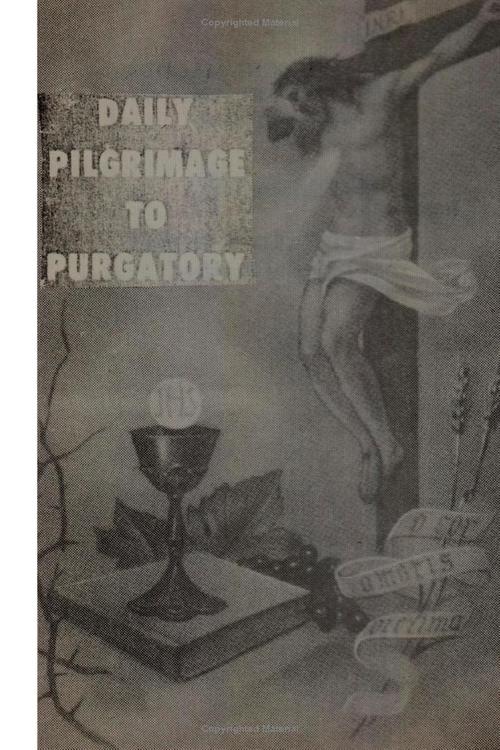
Daily Pilgrimage to Purgatory by Brother Hermenegild TOSF
Introduction:
In the writings of St. Margaret Mary we find the following exhortation: “In union with the divine Heart of Jesus make a short pilgrimage to Purgatory at night. Offer Him all your activities of the day and ask Him to apply His merits to the suffering souls. At the same time implore them to obtain for you the grace to live and die in the love and friendship of this divine Heart. May He never find in you any resistance to His holy will, nor any wish to thwart His designs in your regard. Fortunate will you be, if you succeed in obtaining deliverance for some of these imprisoned souls, for you will gain as many friends in heaven.”
May it please the divine Heart of Jesus to use this booklet as a means of spreading this work of sympathetic love for the Poor Souls everywhere.
The Funny Pharmacy
A joyful mind maketh age flourishing: a sorrowful spirit drieth up the bones. - Proverbs 17:22







Crispy Roast Chicken

Ingredients
1 teaspoon kosher salt
1/2 teaspoon caraway seeds
1/2 teaspoon dried sage
1/4 teaspoon fennel seeds
1/4 teaspoon coriander seeds
1/4 teaspoon dried rosemary
2 tablespoons paprika
2 teaspoons garlic powder
2 teaspoons all-purpose flour
1 teaspoon onion powder
5 tablespoons vegetable oil
1 (4 pound) broiler-fryer chicken, cut in half lengthwise
Directions
In a spice grinder or mortar, combine kosher salt, caraway seeds, sage, fennel, coriander, and rosemary. Grind to a coarse powder. Transfer spice mixture to a bowl and stir in paprika, garlic powder, flour, and onion powder; mix in vegetable oil to make a smooth paste.
Pat chicken halves dry with paper towels and tuck wing tips up behind the back. Brush spice paste onto chicken halves, coating both sides, taking care to season under wings and legs. Place chicken halves in baking dish or roasting pan with skin sides up, leaving space around chicken so halves aren't touching.
Roast in preheated oven until a thermometer inserted in a thigh reads 165 degrees F (74 degrees C), about 1 hour. Remove from oven and let rest for 10 minutes before slicing.
Roasted Pumpkin Seeds

1.5 cups raw whole pumpkin seeds
2 teaspoons butter, melted
1 pinch salt
Directions
Preheat oven to 300 degrees F (150 degrees C).
Toss seeds in a bowl with the melted butter and salt. Spread the seeds in a single layer on a baking sheet and bake for about 45 minutes or until golden brown; stir occasionally. Enjoy!
Video sermons and instructions: Timeless timely truths for living the Faith
Christ the King 2010
19th Sunday after Pentecost 2011
18th Sunday after Pentecost 2013
To God Be The Glory
Lamp & Light Bible Study - Matthew 12
Vatican In Exile Podcasts
Family Theater
Family Theater was a program created to promote family unity and each week saw a drama illustrating the importance of family life and prayer. The main reason for the success of this series was undoubtedly due to the numerous Hollywood stars that participated.
Cast: Bing Crosby, Gary Cooper, James Stewart, Gregory Peck, Shirley Temple Director: Fred MacKaye, Dave Young, Joseph Mansfield, Richard Sanville, Jaime del Valle, Mel Williamson, Robert O’Sullivan, John Kelley Producer: Father Patrick Peyton, Bob Longenecker Host: Father Patrick Peyton Writer: True Boardman , Father Patrick Peyton Announcer:Tony LaFrano
Ranger Bill
Ranger Bill was a Christian radio adventure serial, and aimed at the younger generation. This turned out to be one of the most successful radio broadcasts, and with an amazing longevity of over twelve years. The very first fifteen minute episode was aired on October 2, 1950, but this later changed to a half hour episode, beginning May 14, 1954 and running right through until 1962.
Catechism Corner
Catechizing with a fresh perspective. Using the Holy Scriptures and the Catechism of the Council of Trent as foundational bases.
Lamp and Light Bible Study
Lamp and Light Bible Study is not a ‘theological’ study but a ‘life application’ study.
Our in house Priest will show that every single book of the Bible is interesting and has a message for us today. It deals with key aspects of the Christian life and speaks more to the heart than to the head.
Sunday Sermon
The Ave Maria Hour
The Ave Maria Hour first aired on April 26, 1935, on radio station WOR. It was presented by the Franciscan Friars of the Atonement to help the humanitarian work of St. Christopher’s Inn, and during that first show, Servant of God Father Paul of Graymoor talked about the charity involved in caring for the men of the Inn. In 1937, it was estimated that nearly 1 million listeners were tuning in each week, which resulted in large pilgrimages coming to Graymoor.
The popular Ave Maria Hour continued until 1969, encouraging and entertaining listeners. It was heard on more than 350 stations as well as on the Armed Forces Radio Service. Recorded in a studio in New York City and on the grounds of Graymoor, these dramatizations of the lives of the saints, stories from the Gospel, and inspiring accounts of faith received many awards for religious radio programs sponsored by the American Exhibition of Educational Radio and Television programs of Ohio State University. It received the Golden Bell Award in 1959, presented by Ed Sullivan on live television.
The Bible In Living Sound
THE BIBLE IN LIVING SOUND, the original dramatized audio Bible stories . . . really gets kids excited about the Bible! These 450 spiritually enthralling stories, re-enacted with music and lively sound effects, leave impressions of lasting beauty and wonder, putting the listener in the Red Sea at the crossing, beside David as he confronts Goliath, with Mary and Joseph in the stable, and there at the foot of the Cross. These stunning dramatizations captivate listeners of all ages as they are enriched by visualizing the values taught in God's Word. Listeners want to hear these audio Bible stories again and again.

Six Creation Days
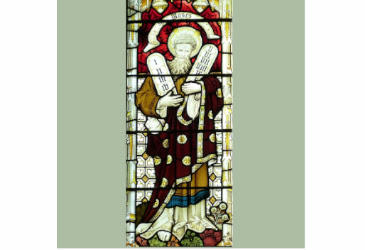
Exodus 20:11
For in six days the Lord made heaven and earth, and the sea, and all things that are in them, and rested on the seventh day: therefore the Lord blessed the seventh day, and sanctified it.
Many Christians are willing to accept what Genesis has to say about creation with one exception. They don’t want to accept the six days as literal, natural, approximately 24-hour days. Did you know that there are other important portions of Scripture that depend on those six days being literal and normal days?
In Exodus 20:11 the Lord is giving the Ten Commandments to Moses. The Lord is explaining the principle of the Sabbath in this verse. God’s explanation says that man shall work six days and rest on the seventh because God Himself made the heavens and the earth in six days and rested on the seventh. Therefore He blessed the seventh day. This truth is repeated in Deuteronomy 5:13.
Surely no Christian would argue that the Ten Commandments are poetry to be taken figuratively. The Lord is confirming here that His work of creation really occupied six normal days and that He rested on the seventh normal day. If these days were actually long ages, then we should work for six long ages before we take some rest. We can be sure that this is not what the Lord has in mind.
If the Ten Commandments should not be interpreted literally because of this connection with creation, where does that leave us? Surely the creation days, by the Lord’s own confirmation and commandment to us, are literal, natural, approximately 24-hour days!

Catechism Catch-Up
“He Is the Saviour of the Body”

It has been observed that the home is the foundational stone upon which is built the Church, the community and the nation. It is also true the husband/father’s heart has a profound influence on the quality of the home. Thus ultimately, all institutions are influenced by how men walk with God.
More than one man has found himself married to a selfish woman that he found impossible to correct. Deciding to trust the power of the Word to meet what was seemingly unreachable, he decided to proceed with reaching out for a closer walk with God and family Bible reading and praying the rosary together. The results are amazing. Faith still comes by hearing. When a husband chooses to bring the Word and the mysteries of the rosary consistently into everyday life, God still changes lives.
One cannot overestimate the place that Christian manhood fills in home life in meeting the needs of a wife.
Even godly women have deep emotional needs and desires that will be supported by a husband who is finding his way through his walk with Christ.
The focus of this lesson is on what is put into a family’s life by the man of the house, both consciously and subconsciously. When a husband/father consistently puts family worship into the family schedule, he is saying how much he values God’s place in his life. The way he picks up the Bible and the way he approaches the Rosary form daily habits. These habits secure a wife’s weaker emotions and establish the child’s impressions as to who God is and what place He fills in life.
The observation is generally made that we know what is law in the state by what the officers of the law enforce. We all know if people are not given tickets for violating the miles per hour sign, then it is assumed the real law is the invisible ten or fifteen miles per hour higher. The same is true in life.
No matter what the parish Priest stresses, or what the school standard is, it’s what Dad actually does that leaves the pattern that will be followed.
This lesson may tend to gravitate toward the father’s influence on the children. Since our study is marriage relations, we will put forth effort to observe the emphasis that when the husband walks with God, he will influence his wife in a godly direction and give her fulfillment in life.
“Because the husband is the head of the wife, as Christ is the head of the church. He is the saviour of his body.” Ephesians 5:23
The husband is first called to “husband” his wife, before any other household responsibility. It is a solemn responsibility to be custodian over a woman’s heart, mind and emotions. Her desire is to her husband. She has deep unexplained cravings to find fulfillment in him. She wants to know what he is thinking and how he feels over countless issues. When she does not feel she has his heart, she feels an emotional unraveling.
A man can soon be frustrated in this demanding regimen. He was accustomed to living his own life. Even talkative men are private with their thoughts. His frustration can turn to methods of evasion. He can mock his wife’s passion for him. He can develop other interests that ignore her.
If he chooses these responses, he may one day be in dismay over what he has helped to create. A man with an unhappy wife should seek to see how his early responses helped create the “wreckage” he lives with later.
Husbands are to husband. They are the bands to hold their house together. First they are to hold their wife’s heart. Next they reach out to the whole family. There are many tasks involved in this calling.
God has established the husband/father to be the spiritual leader/servant in the home. The call to men to lead the wife and children in home life is from God. He created men, He can give them the abilities, and He has the right to call men to this task. Since God gives the abilities and the assignment, we can rightly conclude He will hold men responsible for their leadership choices.
A man may sense his leadership is resisted. Being a coward by nature he can easily slip into avoidance mode. He will be tempted to duck below the radar and let the women take charge. This is not God’s plan.
Or, a man may feel that since he is called to lead, then he can make decisions that please his nature. This too is not God’s plan. When a man is selective in leadership he creates a temptation for his wife to become involved in a power struggle with him.
Leadership is about servant-hood. A true man of God will be on the alert for problems or needs that beg to be addressed. If it is a need in his wife’s life, or in his family life, he should first spend time in prayer, seeking wisdom from above. If it is a need with something material, then perhaps he should simply get busy and fix the faulty fixture.
The point is, he is to take responsibility. He should assume he is to address needs and find solutions. That’s what leadership consists of.
As the spiritual leader, the husband is to establish a spiritual atmosphere in the home.
Every man has his own set of temptations. If he is not experiencing victory, even if it is in his thought life, then the hedge God puts around that home is compromised. Sadly, some men have found Satan made inroads into their homes and found it paralleled the times when they were not walking with God as they should have been. It is right for men to beseech God to maintain this hedge around their home.
Along with his own active walk with God, the husband is responsible to see that God is brought into family life. He should insist as much as possible that the family sits together for meal times. “Cafeteria” style meals are missing a key ingredient of family togetherness. After the family has gathered together, he should see there is meaningful, audible prayer made to God.
There also needs to be a family worship time. The father should establish a normal time and place for this to be done. Family worship should not have to compete with a rushed schedule to get the children off to school, or sleepy time when the children can hardly stay awake. Fathers may want to give forethought to making family worship meaningful. Worship time is prime time to sow seeds for time and eternity.
The husband should be willing to lead the wife in her spiritual journey, helping her find answers for the questions she faces. The woman is not to disrupt the assembly, nor to draw the ministry off into private conversation by themselves. She is to ask her own husband at home. This endorses the concept that women will have spiritual questions. They may also have doctrinal questions or want to know about prophetic issues. These questions are entirely appropriate for a woman. But she is to ask her husband at home. If she asks him, he should give her a decent and respectful answer. Many women think very differently than their husbands. Their questions may seem strange to their men. But that doesn’t warrant men to mock or make fun of their wives for their questions.
Women leave a profound influence on children, and as they grow older, on the younger women. They need to know what they believe and why they believe it. In the past, women who have not believed correctly have been instrumental in bringing false doctrine into the parishes. These women should have had husbands who were willing to take their place and guide their thinking.
Part of having a spiritual home is commanding respect from children and establishing order in the home. A father’s male figure and masculine voice often command respect more quickly than the wife’s does. But his presence alone will not always carry the weight it should. The father will need to lead out in making sure the child learns to hearken to authority and be in obedience.
When children are unruly and cannot be directed, it is the responsibility of fathers to correct this problem.
Each father should sense his responsibility to maintain godly standards in his home, perhaps over and beyond the standards of his contemporaries. We may well wish for simpler times. We cannot escape the fact we live here and now in an age of many temptations. In order to guide children in the stages of life, fathers must have the platform of respect and cooperation established long before the normal age for adult freedoms.
Driving a car extends boundaries. Having a cell phone does the same. But all these tools do is extend the faculties one already exercises. Youth of every generation had the ability to use their hands and feet, to speak and to listen and so forth. Parents have needed to discern if youth had internal controls to guide them when external fences were no longer in place.
This responsibility is really no different today. While the world of entertainment may be brought into your son’s bedroom by technology, he once could wander to the town square and find the same temptation in physical form. The Proverb writer looked from his window and saw a woman dressed as a harlot. Your son today may check his email and find a letter from today’s strange woman.
A godly father is responsible to be the protector of his wife, his children, and his home. When he provides godliness, love and virtue, there will not be a vacuum there to draw the filth of the world in. But when he provides no godly resource and reservoir, then a vacuum naturally exists. The problem today is we cannot build a dam strong enough to cover all the opportunities for evil and prevent them from pouring into our homes.
It is a sign of spiritual weakness and a cause of heartache and negative consequences when a father permits his own base carnal nature to undermine godly convictions.
Eli’s sons saw their father eat too much day after day until he was very heavy. He used his priest’s office to live the good life. Watching his example, his sons took the liberties a step farther. They chose to live licentiously with the women that come to the tabernacle. This brought great shame to the people of God.
Did Eli connect the dots? Could he see that even though he would not have taken liberties to the point his sons did, he paved the way for them? Could he see that his own example was shouting so loudly that the sons could not hear his admonitions?
Serving as savior of the home is a sacred calling. Headship in the home is not a position of prestige but of deep self-denial. It can only be maintained as one keeps a vibrant experience with Christ each step of the way.
Seven Questions to Ask in the Midst of Difficult Circumstances
How to recognize the transforming work of Christ
When suffering comes, we want answers. We live in a world that is marred by sin, so difficulties, hurts, and disappointments are bound to cross our path. Nevertheless, as you seek the Lord to understand why He allowed the suffering to occur, you can also use questions to see how God can redeem these situations and bring benefit to your life through these trying experiences.
Scripture teaches us that “we know that all things work together for good to them that love God, to them who are the called according to his purpose” (Romans 8:28). Searching for God’s answers and learning to view “bad things” as avenues to “good things” are attitudes and perspectives that God wants His children to develop as they mature spiritually.
As you seek to discern how to find meaning, strength, and growth when trials come, these seven basic questions can be a helpful tool for you. By asking questions and seeking wisdom and guidance from God, you can discover purpose as you recognize the transforming work of Christ, even in the midst of suffering.
1. How can this situation help me understand more about Christ?
Jesus suffered more than we can ever imagine. He was falsely accused, ridiculed, betrayed, beaten, and abandoned. He suffered one of the most humiliating and excruciating deaths practiced in His day. Isaiah’s prophecy that the Messiah would be “despised and rejected of men; a man of sorrows, and acquainted with grief” (Isaiah 53:3) was fulfilled in every way.
Do you think Jesus was ever tempted to be bitter toward those who caused His suffering? We know that the Bible teaches that He was “in all points tempted like as we are, yet without sin” (Hebrews 4:15). “Without sin” is key and the difference between man’s natural, sinful responses of hate, bitterness, and retaliation and Jesus Christ’s responses of trust, forgiveness, and perfect obedience to His Father’s will.
How, then, can we face our trials without sinning? The next verse in that Scripture passage gives us the answer: “Let us therefore come boldly unto the throne of grace, that we may obtain mercy, and find grace to help in time of need” (Hebrews 4:16). Again, we must turn to the Lord in prayer and receive His grace!
Jesus showed us the correct way to respond to suffering. On the cross, Jesus exhibited trust and humble submission to His Father’s will. In your hard circumstance, unexpected tragedy, or heartbreaking disappointment, you can learn to respond as Jesus did—He knew God the Father had a perfect will that culminated in blessing. The Apostle Paul counted it one of his highest callings to know Christ and His righteousness, and he recognized that any suffering he would endure would bring him closer to that goal (see Philippians 3:8–11).
As you study God’s Word, notice Christ’s responses whenever He suffered. As God guides you by His Holy Spirit, follow Christ’s example in each situation you encounter. Through your suffering, you can grow in a greater understanding of and more intimate relationship with your Savior.
2. How can God use this situation to produce humility in me?
Suffering often has a way of bringing us to the end of ourselves. We are humbled when we feel helpless and hopeless as we face seemingly insurmountable difficulty. When we exhaust our own resources or strength, we tend to better sense our need for help. Trials can soften us or slow us down so that our ears and hearts become open to hear what God wants us to learn. God tells us in His Word that “he [hath] respect unto the lowly: but the proud he knoweth afar off” (Psalm 138:6).
Trials can soften us or slow us down so that our ears and hearts become open to hear what God wants us to learn.
When you suffer, look for ways to learn humility. “He hath shewed thee, O man, what is good; and what doth the LORD require of thee, but to do justly, and to love mercy, and to walk humbly with thy God?” (Micah 6:8). Do you know why God let the children of Israel wander in the wilderness for forty years? In the Bible, God tells us some of the reasons: “And thou shalt remember all the way which the LORD thy God led thee these forty years in the wilderness, to humble thee, and to prove thee, to know what was in thine heart, whether thou wouldest keep his commandments, or no” (Deuteronomy 8:2). What situations in your life is God using to produce humility in you?
Humility is also another attribute of Christ. He says to the downtrodden, “Come unto me, all ye that labour and are heavy laden, and I will give you rest. Take my yoke upon you, and learn of me; for I am meek and lowly in heart: and ye shall find rest unto your souls” (Matthew 11:28–29). We can learn humility from Jesus Christ.
We also know that God opposes the proud but gives grace to the humble (see James 4:6 and I Peter 5:5), and we desperately need His grace, especially during times of difficulty and suffering! If humility is the path to God’s grace, we should do all we can to humble ourselves before Him.
3. What character qualities might God develop in me through this situation?
Your Heavenly Father wants you “to be conformed to the image of his Son” (Romans 8:29). As the Lord gives you grace to respond to each circumstance as Jesus would, you will develop Godly character. According to the Bible, even the Son of God learned obedience through what He suffered (see Hebrews 5:8).
Carefully review a list of Godly character qualities as you ask yourself: Which ones might be developed in my life as I respond to this circumstance?
For example:
-
Could I learn patience as a result of this circumstance?
-
What can this situation teach me about the need for alertness?
-
How can I learn obedience as a result of this situation?
-
Could this suffering motivate me to express gratefulness for things I’ve previously taken for granted?
-
Might I develop more compassion for others because of this experience?
4. Is this situation God’s loving discipline to correct me?
Because God loves you, He will chasten you as a father chastens a son (see Hebrews 12:5–11). Could your suffering possibly be due to, at least in part, your having disobeyed your Heavenly Father? It is important to remember that “no chastening for the present seemeth to be joyous, but grievous: nevertheless afterward it yieldeth the peaceable fruit of righteousness . . .” (verse 11). There is a loving purpose in the Lord’s discipline of His children. David wrote in Psalm 119: “Before I was afflicted I went astray: but now have I kept thy word” (verse 67), and “It is good for me that I have been afflicted; that I might learn thy statutes” (verse 71). He also acknowledged that God “in faithfulness has afflicted me” (verse 75).
When the Holy Spirit convicts you of sin, this is another opportunity for you to learn humility and repent. “If we confess our sins, he [God] is faithful and just to forgive us our sins, and to cleanse us from all unrighteousness” (I John 1:9). Repentance is the only pathway back to a restored relationship with your loving Heavenly Father. Jesus urged the lukewarm church at Laodicea: “As many as I love, I rebuke and chasten: be zealous therefore, and repent” (Revelation 3:19).
5. Is this suffering preparation for me for future leadership?
The life of Joseph in the Old Testament provides an excellent example of suffering that thoroughly prepared a man to fulfill his destiny to be a great leader. After being sold into slavery by his brothers, Joseph became a servant of the Egyptian commander Potiphar. In this position, Joseph learned to manage projects, property, and people.
Later, when falsely accused and imprisoned, he learned humility. Despite his brothers’ abuse when he was young, over the years Joseph learned the value of mercy and the sovereignty of God. Joseph would later lovingly share with his brothers this profound statement: “But as for you, ye thought evil against me; but God meant it unto good, to bring to pass, as it is this day, to save much people alive” (Genesis 50:20).
Joseph’s life was kept secure in the Lord’s hands. These hardships and more were ultimately part of God’s redemptive plan to prepare Joseph for leadership. Through his position as second in command to Pharaoh, Joseph was able to save his family, and ultimately the nation of Israel, from certain death. And, of course, we know that without Israel, we would not have our Savior Jesus Christ. How might God be allowing your suffering to prepare you for leadership?
6. How does God want to bless others through me?
Jesus commanded us to love one another (see John 15:12, 17). God doesn’t merely want to bring you good from your suffering; He also wants to benefit others through the hardships you encounter. As God shapes your character, strengthens your faith, and teaches you more about Christ through your trials, He will then be able to better use you as His instrument to impact and encourage others.
One of the best “cures” for suffering is that of turning your eyes from your own thoughts and emotions and looking around to notice and respond to the needs of others. If you turn inward and become depressed or confused, then God cannot love others through you. If we have allowed God to comfort us during our trials, then we are able to comfort those who are experiencing similar difficulties (see II Corinthians 1:3–4). What a blessing that we can learn and grow and then share with others, so that they do not have to endure their suffering alone!
When God allowed Joseph to suffer, He didn’t merely bless Joseph. God also blessed Joseph’s family, and He bestowed blessings upon the nations! “And God sent me [Joseph] before you [Joseph’s family] to preserve you a posterity in the earth, and to save your lives by a great deliverance. So now it was not you that sent me hither, but God . . . God meant it unto good, to bring to pass, as it is this day, to save much people [the entire nations of Egypt and Israel] alive” (Genesis 45:7–8, 50:20).
God’s perspective encompasses the world: “For God so loved the world, that he gave his only begotten Son, that whosoever believeth in him should not perish, but have everlasting life” (John 3:16). Through your suffering, He wants to broaden your perspective to see the world as He does.
7. What are possible benefits of my suffering?
To help avoid the trap of bitterness, consider compiling a list of potential benefits that God may bring about through your suffering. Using the earlier questions and the list of character qualities as tools, ask God to show you ways that He wants to redeem your suffering.
Often the benefits you discern will motivate you to respond to your suffering with joy and peace as you trust God to fulfill His purpose for your pain. Jesus Christ Himself endured the suffering of the cross for the joy of the rewards that were to come through His obedience and sacrifice (see Hebrews 12:2).
As you choose to trust God to accomplish His purposes through your suffering, you can grow in the grace and knowledge of the Lord (see II Corinthians 5:7 and II Peter 3:18). You can be confident that God will not allow anything to happen to you without His permission. He will not let any “bad thing” happen that will not ultimately bring more good than destruction (see I Peter 4:12–13, Isaiah 55:8–9, Job 1:6–12, and Psalm 121:1–8).
Keep Your Eyes on Jesus
Look “unto Jesus the author and finisher of our faith; who for the joy that was set before him endured the cross” (Hebrews 12:2). You too can respond to suffering with joy and peace as you trust God to fulfill His purpose for your pain. God is able to bring good out of evil, if we will submit to Him and give Him the authority in our lives to redeem it for His higher purposes. By His Spirit, God can give you life and peace—in every situation—as you look to Him for the answers.
To Learn More Principles For Life Go To: Resources: Principles of Life


Fr. Francis having communion for Catholics at a Topeka Independent Residence
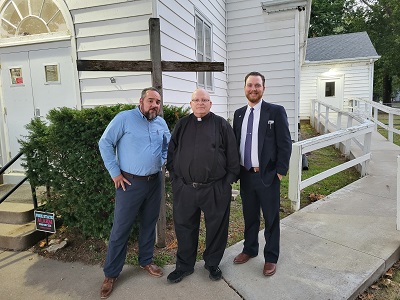
Fr Francis was invited to meet with some Baptist ministers for a Q&A about the Catholic Faith! Had a fruitful meeting and ate some Chic-Fil-A!

Fr. Francis having a meal with a couple of his parishioners at Golden Corral!

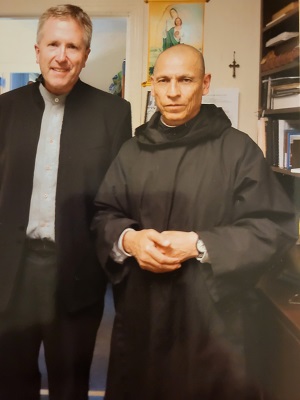





- Please continue to pray for the repose of the soul of the Holy Father, Pope Michael I.
- Your prayers and support are asked for the House of Prayer in Topeka Kansas.
- Your prayers and support are asked for in a practical way for our domestic missionary work: for traveling expenses to offer mass in other states as Society of Saints Paul And Silas (SSPS) missionary priest travel. Can you help?
- Please pray for the preparations for the Coronation of Pope Michael II on October 28.
- Please pray for those who will be consecrated Bishop in October by His Holiness.
- Please pray for the health of Deacon Stephen and his dear wife.
- Be sure to keep St. Helen Catholic Mission in your prayers. Why not go on over to the site now and see what they have to offer and how you might be able to help!
- We are all praying especially for you, too. May you correspond with every grace of God!
- In what other needs or intentions may we pray for you? Let us know at vaticaninexile@gmail.com
- Let us remember that the Church runs on prayer. Without your prayers, God will not work in hearts and souls to bring them to a knowledge of the truth. (I Timothy 2:4)


To Donate online go to:
Donations

To Donate by Mail:
Our address is
Vatican in Exile
423 NE Grattan ST
Topeka, Kansas 66616
Make Checks payable to:
Vatican in Exile











 Follow
Follow


